#go gay with danny kaye!
Text
if you say so 🫡🫡
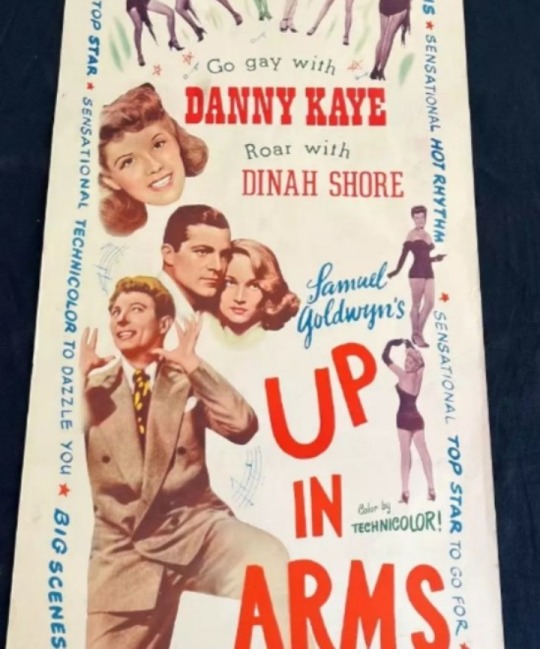
#my ebay recommendations slaying serving etc as per usual#go gay with danny kaye!#up in arms 1945#danny kaye
5 notes
·
View notes
Text
hmm thinking thoughts about danny kaye tonight
#him in white christmas#and the first dance scene#hiiiiiii <3#men that make me go#gay#danny kaye#white christmas#irl
9 notes
·
View notes
Note
i found this blog by accident (i think the tumblr recommendations code or whatever figured out i have a polls addiction) and have had zero interest and experience in this topic but now. now i am so here. but i was wondering where i could go to watch movies with all these actors?? like i’m sure prime video or smthg might have a few classics hanging around but is there a service/website (of any legality) that specialises in vintage films and stuff? or is it really just physical media to get a lot of them? sry if this throws off your askbox, i didn’t know where else to ask! tyia <3
Hi!! I love this ask. Thanks for being here!
I don't know of any service that specializes in old movies, though HBO had a deal with TCM for a while that meant they had several classics on Max—I don't know if that's still a thing. In the meantime, though, the following websites all have "classic" channels that will be filled with great vintage movies to try:
Tubi—free streaming service that includes:
The Manchurian Candidate (Frank Sinatra, James Edwards)
The Philadelphia Story (James Stewart, Cary Grant)
Chitty Chitty Bang Bang (Dick Van Dyke)
On The Town (Gene Kelly, Frank Sinatra)
House on Haunted Hill (Vincent Price)
The Adventures of Robin Hood (Errol Flynn, Basil Rathbone)
A Streetcar Named Desire (Marlon Brando)
The Maltese Falcon (Humphrey Bogart)
Hoopla—free through many libraries:
The Court Jester (Danny Kaye, Basil Rathbone)
War and Peace (Jeremy Brett)
Barefoot in the Park (Robert Redford)
Cabin in the Sky (Rex Ingram)
Wings (Gary Cooper)
Kanopy—free through many libraries:
The General (Buster Keaton)
Flower Drum Song (James Shigeta)
Roman Holiday (Gregory Peck)
Seven Samurai (Toshiro Mifune)
His Girl Friday (Cary Grant)
Wuthering Heights (Laurence Olivier)
Sabrina (Humphrey Bogart)
Paris Blues (Sidney Poitier, Paul Newman)
Cabinet of Dr. Caligari (Conrad Veidt)
Youtube also has TONS of movies that have slipped through copyright or "accidentally" ended up there:
Charade (Cary Grant)
The Gay Divorcee (Fred Astaire)
Lying Lips (Carman Newsome, Robert Earl Jones, Oscar Micheaux)
Stormy Weather (Harold Nicholas)
Rebecca (Laurence Olivier)
The Cheat (Sessue Hayakawa)
The Lady Vanishes (Michael Redgrave)
Jungle Book (Sabu Dastagir)
To Sir, With Love (Sidney Poitier)
It's a Mad Mad Mad Mad World (Peter Falk)
What a Way to Go! (Dick Van Dyke, Gene Kelly, Paul Newman)
And of course there are methods of other legality if you want to go searching for titles by hand :)
I haven't seen all of the movies I list here—this is just a sampling of some famous ones, and a few of my secret faves—so be careful if you have trigger warnings and things. Hope you find some great movies!
#:D#i went a bit insane there. but you see. hot men!#if i had to pick one i'd say tubi has the best rotating selection?#anyway good luck anon!#asks#hotvintagethoughts
328 notes
·
View notes
Text
White Christmas is McDanno.
Phil is Danny and Bob is Steve. Danny saves Steve’s life and keeps trying to marry him off while being gay af. Seriously! I love it!
Dressing Room Scene from White Christmas: Phil Davis (Danny Kaye) and Bob Wallace (Bing Crosby)

PHIL DAVIS: Wallace, I think it's time you and I had a little talk.
BOB WALLACE: Yeah, that's a good idea, buster, and if you don't mind, I'll lead off.
PHIL DAVIS: Oh, now wait a minute.
BOB WALLACE: You wait a minute. You know something, for about three months now, you've been clumsily trying to entangle me with some female.
PHIL DAVIS: All I'm trying to do, Bob--
BOB WALLACE: Fat ones, tall ones, thin ones, it doesn't make any difference as long as they're wearing skirts, little mascara, and still breathing, you ram 'em at me.
PHIL DAVIS: Believe me, it's for your own good.
BOB WALLACE: For my own good?
PHIL DAVIS: Yeah, let's face it, Bob, you're a lonely, miserable man.
BOB WALLACE: What?
PHIL DAVIS: And you're unhappy too. And when you're unhappy, I'm unhappy. After all, I feel a strong sense of responsibility to you, Bob, ever since the day I-- (squeezes his upper right arm)
BOB WALLACE: Oh, no. Not again with that life-saving bit.
PHIL DAVIS: Well, if you'd rather forget it.
BOB WALLACE: How can? You won't let me. Since you saved my life, you decided you had the right to run it. You ootched me along every step of the way. You hammered, drove, pushed, shoved, and if that wasn't enough, you'd look at me with those great big cow eyes of yours, point at that phony arm, and I'd melt and go along.
PHIL DAVIS: Well, I don't expect any gratitude.
BOB WALLACE: Well you're going to get it. We did great, and I'm grateful. So, thank you. Thank you, Phil Davis, from the bottom of my heart. Now will you let the rest of my life alone?
PHIL DAVIS: No, I won't.
BOB WALLACE: Well, why not?
PHIL DAVIS: Because you're a miserable, lonely, unhappy man.
BOB WALLACE: Oh, you're wacky. I'm a very happy man.
PHIL DAVIS: Well, then you're happy for the wrong reasons and that's the same as being lonely and miserable except it's worse.
BOB WALLACE: You know something? You're off you're nut about a mile and a half. I've got everything in life I want.
PHIL DAVIS: Oh sure. I'm off my nut a mile and a half--
BOB WALLACE: At least.
PHIL DAVIS: You've got everything you want except the most important thing.
BOB WALLACE: What's this?
PHIL DAVIS: A girl.
BOB WALLACE: I'll get around to that one of these days.
PHIL DAVIS: My dear partner, when what's left of you gets around to what's left to be gotten, what's left to be gotten won't be worth getting whatever it is you've got left.
BOB WALLACE: When I figure out what that means, I'll come up with a crushing reply. What's back of all this anyway?
PHIL DAVIS: Nothing, nothing. Only you're happiness.
BOB WALLACE: My happiness?
PHIL DAVIS: Yeah.
BOB WALLACE: You know, when you get an idea that's for my sole and ultimate happiness, there's always lurking behind it somewhere a little angle for you. Now what is it?
PHIL DAVIS: You really want to know?
BOB WALLACE: Yes, I really want to know.
PHIL DAVIS: All right, I'll really tell you.
BOB WALLACE: Well, then lay it on me, will you?
PHIL DAVIS: Ever since the day we became producers, you're a changed man. You've gone absolutely berserk with work. And the strange thing is, you liked it. You like being Rodgers and Hammerstein.
BOB WALLACE: Well, it was your idea you know.
PHIL DAVIS: Well, sure it was my idea, but I didn't think I was going to create a Frankenstein. From that day on, I haven't had one minute I could call my own.
BOB WALLACE: What do you want me to do about it?
PHIL DAVIS: I want you to get married. I want you to have nine children. And if you only spend five minutes a day with each kid, that's forty-five minutes. And I'd at least have time to go out and get a massage or something.
BOB WALLACE: You don't expect me to get serious with the kind of characters you and Rita have been throwing at me.
PHIL DAVIS: Well, there's been some nice girls, too, you know. Phil: "They didn't go to Smith."
BOB WALLACE: Yeah, yeah, like that nuclear scientist we just met out in the hall.
PHIL DAVIS: All right, they didn't go to college. They didn't go to Smith.
BOB WALLACE: Go to Smith? She couldn't even spell it.
PHIL DAVIS: Oh, that's very funny. (fake laughter) The crooner is now becoming the comic.
BOB WALLACE: Phil, let me tell you something. There's a lot of sense in what you say, and I have to admit it. But the kind of girls you and I meet in this business, they're young and they're ambitious. They're full of their own careers. They're not interested in getting married, settling down and raising a family.
PHIL DAVIS: That's funny, Bob, I never heard you open up like that before.
BOB WALLACE: Someday the right girl is gonna come along, and if she'll have me, we'll get married. We'll settle down, and we'll start having those nine kids for you. Forty-five minutes going to be enough?
PHIL DAVIS: If I need any more, I'll tell you.
End Scene
#mcdanno#hawaii five 0#white christmas#he loves him like a buddy#vintage men#danny kaye#bing crosby#alex o’loughlin#scott caan
6 notes
·
View notes
Text
Hazel Muses about dead peoples romantic/sexual lives and if they were queer or not.
So Like trying to put labels on people isn’t the best. But I’m trying to figure out this whole Sylvia Fine Danny Kaye thing and its like historical curiosity I guess. Like in the time and place they lived you couldn’t really talk about these things and knowledge of them sometimes just wasn’t there.
Like looking at Danny Kaye, traumatized youth who became a funny guy to survive. just pretty normal human stuff. But also learning to dance in like 6 months for a movie, becoming the top non-asian chinese chef, learning to pilot planes, learning to conduct despite not being able to read music, able to replicate accents well enough that native speakers would be really confused they couldn’t understand the utter nonsense he was saying with the accent, etc. This seems to me like he was probably autistic. Not that uh thats what I’m getting at. just a tangent.
So Danny was married to a woman named Sylvia Fine. And this seems to have been primarily a business/friend relationship. They did have a child, but only one. Danny was known to cheat on Sylvia, but I wonder if it was actually cheating, because really from what I can tell Sylvia seemed mostly okay with it. Other than a long affair Danny had with Eve Arden early in their relationship anyway.
So I’m kind of wondering if they were polyam or at least open in their relationships. I’ve seen no mention of affairs on Sylvia’s side. This could be because she was more discrete than Danny, or because she didn’t have them, or just because I have so little info.
From descriptions of her I at first felt, was she a lesbian? But the more I think about this I kinda feel like she was ace. Like she just wasn’t really interested with Sex, but since Danny was she let him go out and have sex. I’m not sure the two even had a strong romantic attachment. I’ve seen stuff that says they didn’t here. And descriptions kind of make me feel like Danny was aromantic/demi romantic. And maybe Sylvia was as well. Like they had a light romantic connection, a strong bond that many people wouldn’t necessarily recognize as romantic.
But I have no way to know really. They’re both dead. I can’t ask them. They’re daughter is still alive, but how aware are most children of their parents sexual/romantic lives?
This could also just be me just not wanting Danny being some Philanderer who was constantly Breaking Sophie’s heart and torturing her over their long marriage.
Anyway I feel like they were a queer couple. And looking at all this old music, you just see so many examples of queer people, that we just pretend weren’t. And because we pretend they weren’t the fact that they were gets lost to history, so that later generations don’t realize they were. So it seems like queer history is empty. It always looks empty.
But we know a lot of these people were queer. I don’t mean like by analyzing and wondering like I’m doing here. We know that one of the Andrews sisters was queer. Her long time partner has talked about it. Billie Holiday was bi apparently. It wasn’t even really a secret at the time. Not to people who knew her at least. But this history is hidden. Sure today it’s not too hard to find if you go to look for it. Details perhaps are lacking, but I don’t need to know the names of Billie Holidays various lovers. It’s just so strange that all of this is shoved back and hidden in the depths of a dusty old broom cupboard. Like queer people have always existed. People that you love, whose voices have moved you, whose acting has brought a smile to your face are queer. But you can’t love that part of them? You have to hide it and pretend it doesn’t exist? How can you love queen’s music, and not acknowledge that you love a queer person? You pretend that Freddie Mercury wasn’t bi when you listen to it. Most of you think he was gay, but you know he was queer. But you pretend that he wasn’t when you listen to his music. You hate queer people, oh but that Freddie Mercury you love his music. How? I just don’t understand how you can love someone like that, but hate such an integral part of them.
How are people homophobic, when they love so many homos?
3 notes
·
View notes
Text

This is so funny to me. Danny Kaye was a professional dancer as well as an actor, and he would have the presence of mind to admire Toumanova's form instead of upskirting her. Especially given that Danny Kaye was a gay man. Bit Fruity. Fond of Lavender. But go off I guess, thanks Deborah
1 note
·
View note
Text
Transformers Siege (WFC) character review!(1/2)
Instead of separating from decepticons and autobots (mainly because of the Predacons and maximals), I’m going to put them in order of which bots I really feel like talking about the most! So, here we go!
*watch for swearing, spoilers, and possible thirst.
/Also, alt modes will NOT be available for this series. They kinda don’t transform too much, and when they do, they hardly let me get a shot, sooo/
Optimus Prime!!;

This Optimus did a full 180 for not only my opinion, but for his own characterization. This Optimus started out as impulsive, reckless, ignorant of other’s opinions, and quite frankly, was just frustrating to deal with. He was the one who essentially sent the Cybertron into a total fuck storm, and as such, doomed MANY lives, including the one of his love, Elita one. Honestly, Optimus is kinda. Dumb, honestly? He literally sent the live source of Cybertron into the vastness of space, just to keep Megatron from winning the war. Literally, EVERYONE hated him at the start, from Bumblebee to Ratchet. Then, get this- he learned from his mistakes. From Skylynx, to the Optimus Primal, to the soul of Elita, to Optimus and Ratchet and even Megatron- he had so many influences telling him what he did wrong. Towards the end of the series, he became the classic, noble, somewhat self conscious mech we all grew to know and love. Honestly? 9/10. He isn’t perfect. Far from it, but damn Optimus KNOWS this, and that’s so great- I can go all day, you guys (also that one moment where he asked Megatron to forgive him at gunpoint, such a good fucking scene).
Elita one!!;

I love her. SO much. She’s a QUEEN. She has been ignored, she has been held hostage, she’s been punched and kicked and shot at-my girl has been through hell. And she carries it WELL. Not only is she FINE, but she is bold, smart, and she is STUBBORN in her beliefs. She is also a natural born leader, and I honestly and really appreciate her. Her death was honestly one of the sadder moments, but her soul’s reunion with Optimus was one of the sweetest things I’ve ever seen. I wish we saw more of her, honestly and desperately (plus she has so many character interactions, there’s SO many ways you can go about her character, it’s incredible). 10/10 my girl is a fighter and she was so ride or die for Optimus (even though I lowkey ship her with those three little cons, ya’ll know the ones) 💕.
Megatron!!(Siege);

Every Megatron has something different about them. For example, this series has two Megatron’s (three because Galvatron), but we’re talking about the Megatron that we start the series with. The sort of ‘G1’ Megatron. This Megatron has a few...issues. Lips aside, this Megatron has a few things I’d change about him. He’s insane, he’s incredibly selfish, and honestly? His character interactions leave something to be desired, in my opinion. However, he does have a blend of good traits. You guys remember Prime Wars Megatron? How this man refused to go down without being ‘fuck you’ to his opponent? This Megatron had those moments, telling Galvatron right the fuck off when he tried to present him with a decision to join him. I love a Megatron that refuses to back down. I also appreciated the regret he clearly has for stuff he did (we all remember what happened to that one power plant), and I appreciate that In a Megatron. Couple that with the pompous villain aesthetic (he had his own pictures hung up on a wall for fucks sakes). However, he isn’t my favorite Megatron (that’s a tie between Prime/Prime Wars Megatron). 7/10. Fun in some cases, but not someone I think I’ll deem my favorite Megatron.
Megatron!!(beast wars);

This Megatron was kinda doomed from the start. From the issue with his VA (not everyone can be David Kaye, but still), to the odd way he simped over the other Megatron, kinda made me dislike seeing him on the screen. Don’t me wrong, he wasn’t AWFUL, and like everyone else on the show he LOOKED good and his VA did...okay. Listen, he had a REALLY good simp voice. But beast wars Megatron actually saw the old Megatron as an old fool. Now he suddenly worships him? It kinda makes this Megatron look pathetic, and I’m not really into it. 4/10. I’m sorry, but I appreciated him more when he wasn’t on screen.
Ironhide!!;
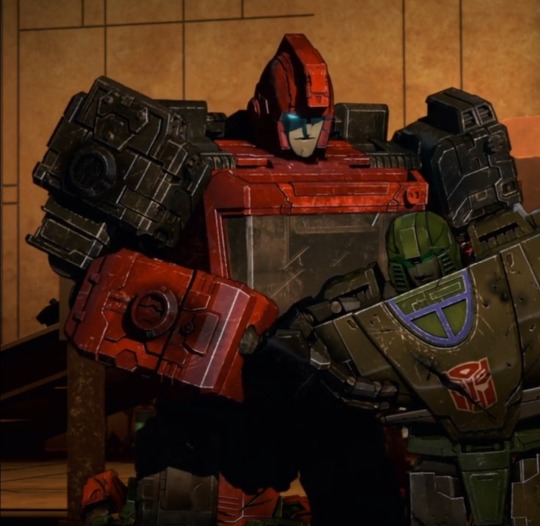
He did like. Nothing in this series. He only really spoke to tell Optimus what he did. He’s just so cute and I liked hearing him speak. Not the same Ironhide voice, but still I love him terribly 10/10 he is but a baby waby.
Sideswipe!!;
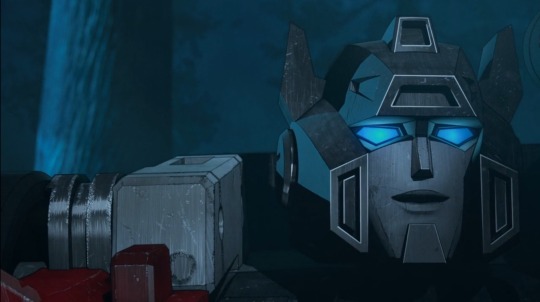
He did like, two things in total in this series, and BOTH made me feel something. He also misses his brother Sunny and it honestly hurt me. Someone hold and support him, 8/10 this precious bundle of red-
Skyfire!!;

This Skyfire actually starts off as not only a decepticon, but a HIGH ranking decepticon, pretty much Megatron’s second hand. He was pretty decepticon motivated, up until Megatron decided the whole genocide of an entire race was too much for her. Honestly his role was a LOT like MTMTE Impactor in this series. A close believer changed to the opposite side, because Megatron’s dumbass got carried away. This Skyfire died, but up until that, he was determined to help the cause. He was literally willing to have a bomb implanted into him just to prove he was with the autobots. He was bold, stubborn, and everyone he interacted with was GREAT. 8/10. Tbh, probably my second favorite Skyfire (hard to compete with Cyberverse).
Impactor!!;

Pretty much the first time I’ve seen him in a show (at least noticeably) and I appreciated his little debut here. Impactor betrayed the decepticon, and in the best way possible. Not because he thought the cause was wrong, but because he got a super hot medic boyfriend, who JUST so happens to be an autobot. Seriously, ratchet fixed his booboos and Impactor just went ‘Listen I’d die for you’. Did anyone but Ratchet trust him? Nope. Did Mirage like him? Nope. Did we give a shit because he was very literally, ride or die for Ratchet? Also nope. Like this dude deadass was willing to go through the ‘we don’t trust decepticons’ bullshit, JUST because Ratchet swept him off his feet. 10/10, Impactor didn’t deserve to die, he deserved to be the hostile gay to suit the hostile lesbian that was Blackarachnia. 💜
Ratchet!!;

This Ratchet was like. The ONLY Ratchet I’ve ever seen, who just fucking hated Optimus. Seriously, this dude just wanted to be alone with his husband. Wanted NO part of Optimus, no part of Bumblebee, NO ONE. He’s sarcastic, bitter, and he WILL give you shit over Impactor or any of his patients. He’s a sour/sweet old man and even though I wish I saw him more, I love him and adore him with my big ol’ heart. 9/10, everyone can eat my ass I’m not over Impactor still.
Wheeljack!!;

Chaotic bastard. Smartass, dumbass, gay ass, and the first character to say ‘ass’, I love him. He doesn’t play much in terms of actual plot stuff (he’s like, a support character tbh) but the few times he was on screen, I loved him. It was like someone gave Danny Devito a PHD. 8/10, just needed to be able to give more one liners like he deserved.
56 notes
·
View notes
Text
WILDCAT
December 17, 1960
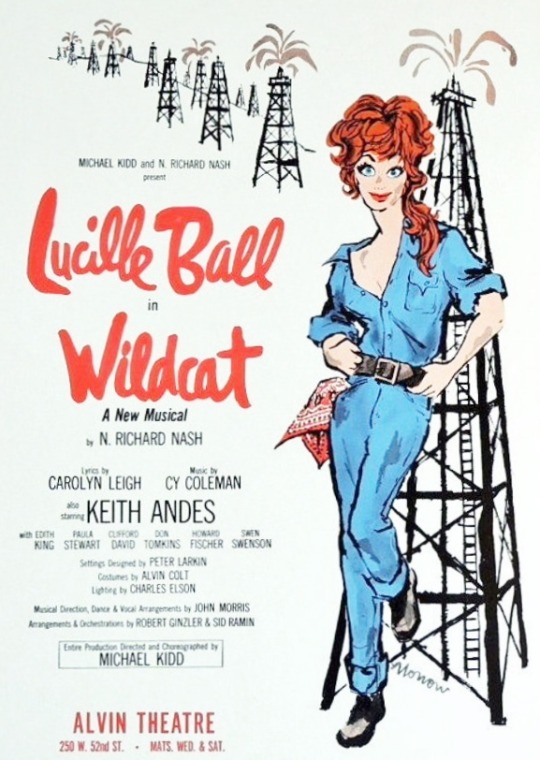
Wildcat is a musical comedy about Wildcat Jackson and her sister who come to oil country in 1912 to strike it rich. She runs into the prowess of Joe Dynamite, and a battle of the sexes and the oil tycoons ensues.
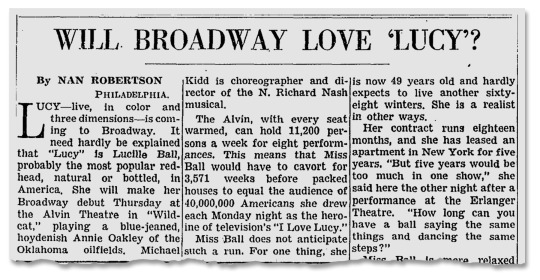
Wildcat wasn’t written with the 48 year-old queen of comedy in mind so when she showed interest, the script by N. Richard Nash had to be radically re-written.
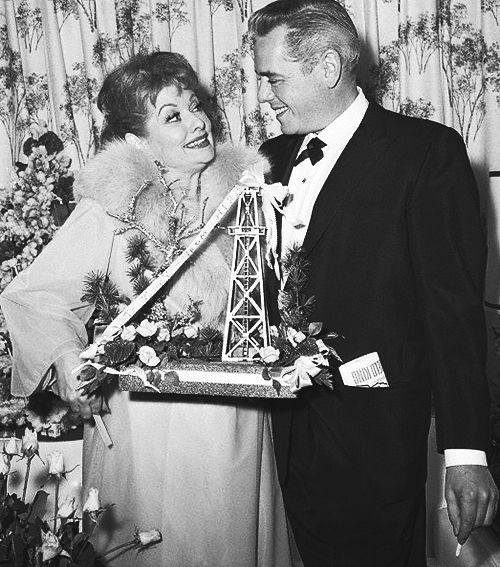
At the start of the 1960’s Ball’s career was taking a new direction. She was leaving her TV personae Lucy Ricardo (as well as her real-life husband Desi Arnaz) behind for newer horizons. It was their company Desilu that would produce Wildcat with Lucy having say over who would be cast as her co-star. After several of her first choices proved not available (including Clint Eastwood), she settled on Keith Andes.
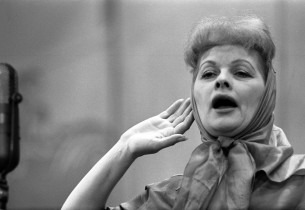
Although Ball was not known for her singing (a fact she traded on in “I Love Lucy”) or her dancing (which she was far better at), she had the determination of Wildcat Jackson to attempt it eight times a week.
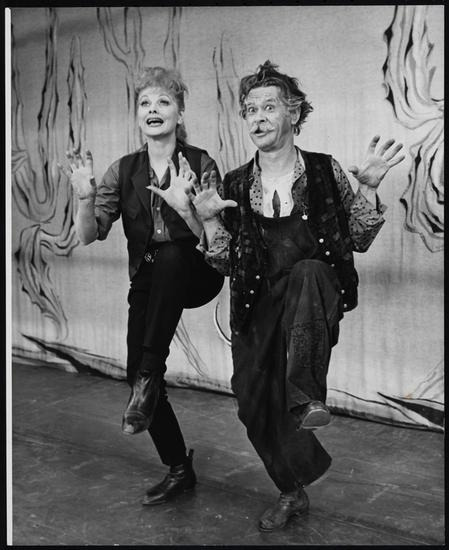
Director and choreographer Michael Kidd – known for his athletic dances – would put Ball through her paces. The score was by Cy Coleman with lyrics by Carolyn Leigh, giving Ball the rousing anthem “Hey, Look Me Over!” and the tuneful “What Takes My Fancy.”
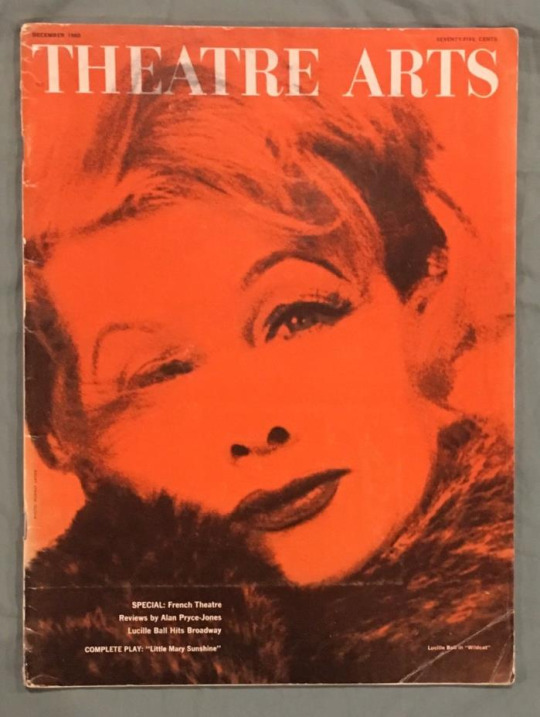
The out-of-town critics were mixed, but obviously adored the red-headed star. The show was headed up the New Jersey Turnpike in trucks headed for Broadway when a serious blizzard stranded the caravan, causing the opening night to be delayed.

With just two previews under their belt, the show opened at the Alvin Theatre (now the Neil Simon) on December 17, 1960. Box office sales were buoyed by audiences expecting to see Lucy Ricardo, not Lucille Ball as Wildy Jackson, so eventually Ball interpolated more and more of her trademark comic inflections into her character.
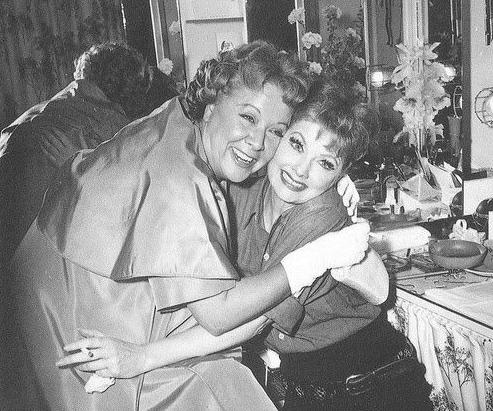
Then Ball took ill. She left the show for a bit with the idea to return and continue the run. But upon her return she collapsed on stage. Producers decided to close the show for as long as it took her to recover and resume when her strength and health had returned. But the musicians union insisted upon payment during the hiatus, which made the wait financially unfeasible.
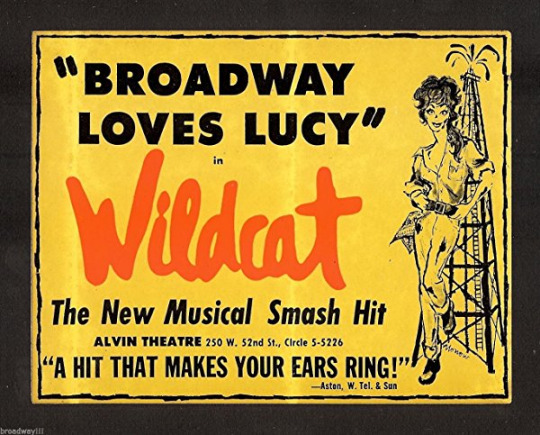
All in all, Wildcat lasted 171 performances. It wasn’t Ball’s only musical, however. In 1974 she took on the title role in the film of Mame with mixed to poor critical reactions.
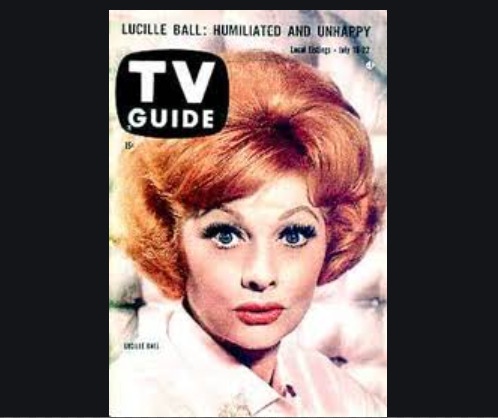
"Then I go to New York with the two children, my mother and two maids. We have a seven-room apartment on 69th Street at Lexington. I’ll start rehearsals right away for a Broadway show, 'Wildcat.’ It’s a comedy with music, not a musical comedy, but the music is important. I play a girl wildcatter in the Southwestern oil fields around the turn of the century. It was written by N. Richard Nash, who wrote 'The Rainmaker.’ He is co-producer with Michael Kidd, the director. We’re still looking for a leading man. I want an unknown. He has to be big, husky, around 40. He has to be able to throw me around, and I’m a pretty big girl. He has to be able to sing, at least a little. I have to sing, too. It’s pretty bad. When I practice, I hold my hands over my ears. We open out of town - I don’t know where - and come to New York in December.” ~ Lucille Ball, TV Guide, July 16, 1960
THE SCORE
Lyrics by Carolyn Leigh and Music by Cy Coleman

Act I
I Hear - Townspeople
Hey, Look Me Over - Wildy and Jane
Wildcat* - Wildy and Townspeople
You've Come Home - Joe
That's What I Want for Janie* - Wildy
What Takes My Fancy - Wildy and Sookie
You're a Liar - Wildy and Joe
One Day We Dance - Hank and Jane
Give a Little Whistle and I'll Be There - Wildy, Joe, The Crew
Tall Hope - Tattoo, Oney, Sadie, Matt and Crew
Act II
Tippy Tippy Toes - Wildy and Countess
El Sombrero
Corduroy Road
You've Come Home (Reprise) - Joe
(*) Songs cut sometime after opening night.
THE CAST
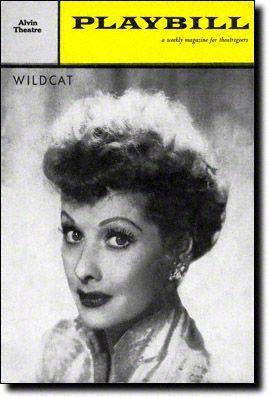
Lucille Ball (Wildcat Jackson) was born on August 6, 1911 in Jamestown, New York. She began her screen career in 1933 and was known in Hollywood as ‘Queen of the B’s’ due to her many appearances in ‘B’ movies. With Richard Denning, she starred in a radio program titled “My Favorite Husband” which eventually led to the creation of “I Love Lucy,” a television situation comedy in which she co-starred with her real-life husband, Latin bandleader Desi Arnaz. The program was phenomenally successful, allowing the couple to purchase what was once RKO Studios, re-naming it Desilu. When the show ended in 1960 (in an hour-long format known as “The Lucy-Desi Comedy Hour”) so did Lucy and Desi’s marriage. In 1962, hoping to keep Desilu financially solvent, Lucy returned to the sitcom format with “The Lucy Show,” which lasted six seasons. She followed that with a similar sitcom “Here’s Lucy” co-starring with her real-life children, Lucie and Desi Jr., as well as Gale Gordon, who had joined the cast of “The Lucy Show” during season two. Before her death in 1989, Lucy made one more attempt at a sitcom with “Life With Lucy,” also with Gordon, which was not a success and was canceled after just 13 episodes.
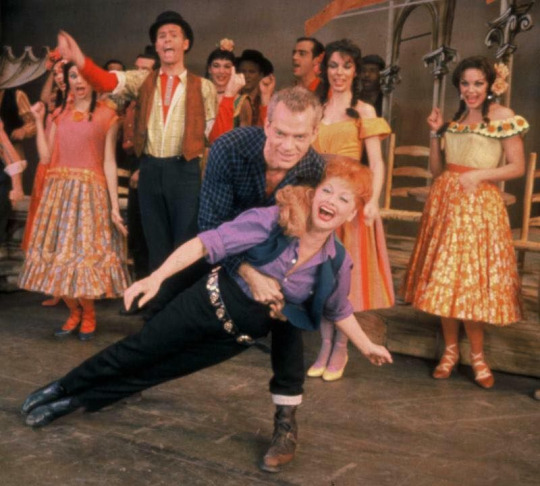
Keith Andes (Joe Dynamite) was born John Charles Andes in Ocean City, New Jersey, in 1920. Andes played Lucy Carmichael’s boyfriend Bill King on “The Lucy Show” in “Lucy Goes Duck Hunting” (TLS S2;E6) and “Lucy and the Winter Sports” (TLS S3;E3) and played Brad Collins in “Lucy and Joan” (S4;E4) co-starring Joan Blondell. Andes took his own life in 2005 after being diagnosed with terminal cancer.
Valerie Harper (Dancer, right) became one of television’s most recognizable stars as “Rhoda” (1974-78) a spin-off of “The Mary Tyler Moore Show.” She appeared in at “Kennedy Center Presents” honoring Lucy in 1986. She died in August 2019 after a long battle with brain cancer.
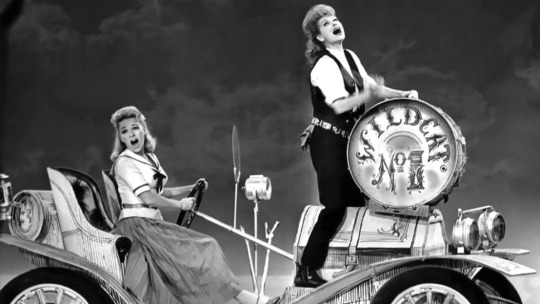
Paula Stewart (Janie) appears in the fourth of her six Broadway musicals between 1951 and 1965. Her only series television appearance opposite Lucille Ball was in “Lucy and Harry’s Tonsils” (HL S2;E5) in 1969. In 2017, she published a memoir titled Lucy Loved Me, about her friendship with Lucille Ball.
Hal Linden (Matt, replacement) became one of television’s most recognizable stars as “Barney Miller” (1974-82). He appeared at an “All-Star Party for Lucille Ball” in 1984 and at “Kennedy Center Presents” honoring Lucy in 1986.
Howard Fischer (Sheriff Sam Gore)
Ken Ayers (Barney)
Anthony Saverino (Luke)
Edith King (Countess Emily O'Brien)
Clifford David (Hank)
HF Green (Miguel)
Don Tomkins (Sookie)
Charles Braswell (Matt)
Bill Linton (Corky)
Swen Swenson (Oney)
Ray Mason (Sandy)
Bill Walker (Tattoo)
Al Lanti (Cisco)
Bill Richards (Postman)
Marsha Wagner (Inez)
Wendy Nickerson (Blonde)
Betty Jane Watson (Wildy Understudy)
Dancers: Barbara Beck, Robert Bakanic, Mel Davidson, Penny Ann Green, Lucia Lambert, Ronald Lee, Jacqueline Maria, Frank Pietrie, Adriane Rogers, John Sharpe, Gerald Tiejelo
Singers: Lee Green, Jan Leighton, Urylee Leonardos, Virginia Oswald, Jeanne Steele, Gene Varrone
MRS. MORTON
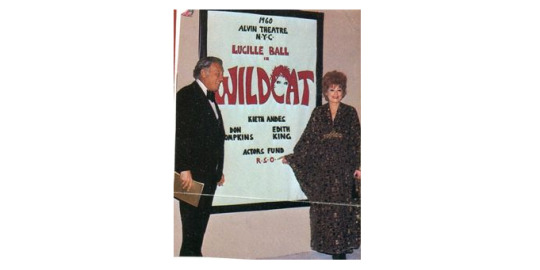
Lucy met Gary Morton while doing Wildcat on Broadway. She put off their first date due to her rigorous performance schedule. Eventually, he showed up with a pizza just when Lucy was craving one. They married on November 19, 1961.
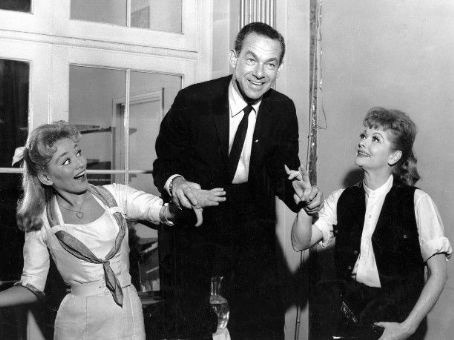
Comic Jack Carter served as best man at Lucy and Gary’s wedding in 1961. A few weeks later he married Paula Stewart, who played Lucy’s sister Janie in Wildcat. He acted in “Lucy Sues Mooney” (TLS S6;E12).
“HEY LOOK ME OVER!”
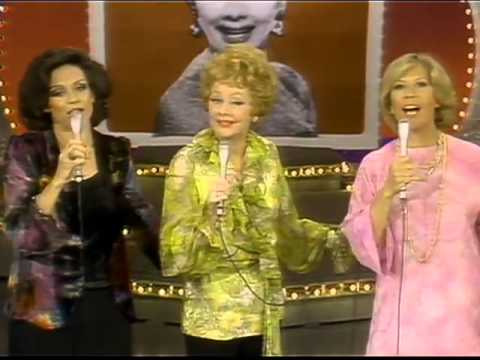
On June 4, 1976 Lucille is joined by Valerie Harper and Dinah Shore on “Dinah!” to sing her signature song from Wildcat, “Hey, Look Me Over.”
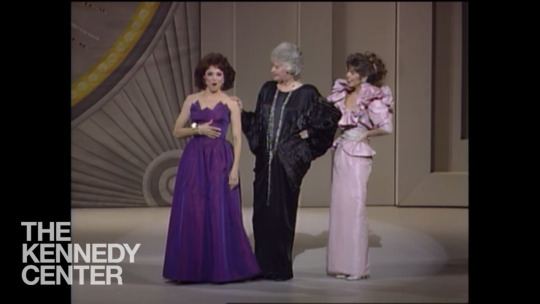
When Lucille Ball was celebrated at “The Kennedy Center Honors” in December 1986, Valerie Harper, Beatrice Arthur, and Pam Dawber sang a song parody of the “I Love Lucy” theme expressing their affection for Lucy. The medley ends with a specially-tailored “Hey Look Me Over”.
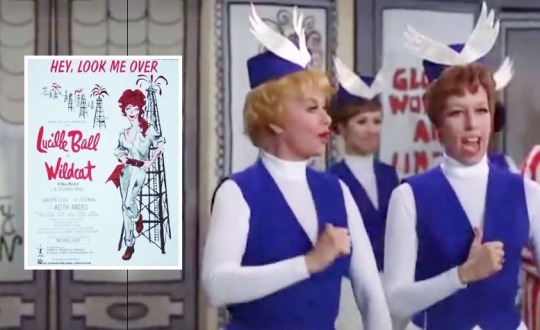
In “Lucy and Carol Burnett: Part 2″ (TLS S6;E15) on December 11, 1967, Lucy, Carol, and the ensemble perform “Hey, Look Me Over” with specially written lyrics to suit the episode’s theme of air travel.
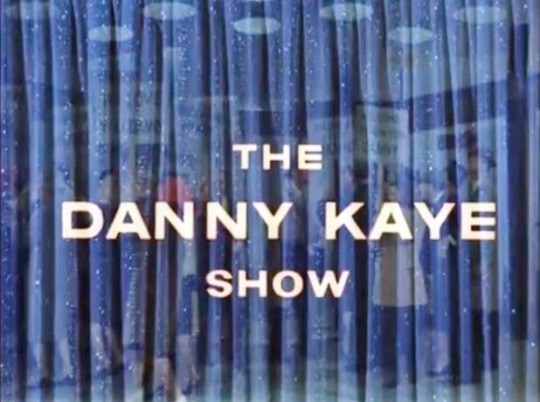
In “Lucy Meets Danny Kaye” (TLS S3;E15) on December 28, 1964, the opening of “The Danny Kaye Show” is underscored with the music to “Hey, Look Me Over.”
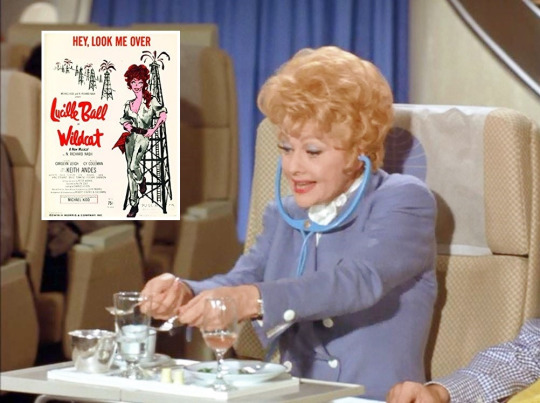
While David Frost is trying to sleep during a transatlantic flight, Lucy wears her headset and hums along to “Hey Look Me Over” while tapping it out on the glasses with her cutlery. The scene is from “Lucy Helps David Frost Go Night-Night” (HL S4;E12) aired on November 12, 1971.
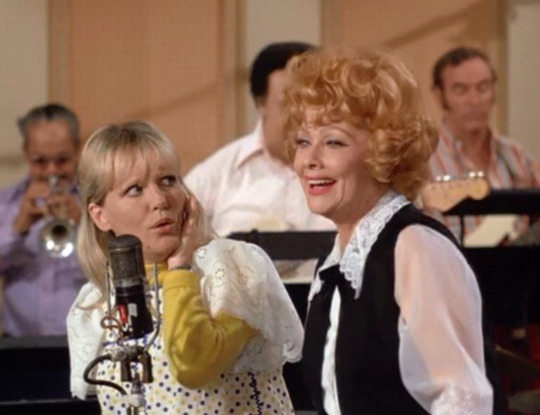
In “Lucy and Petula Clark” (HL S5;E8) in 1972, Lucy Carter leaves the office singing “Hey Look Me Over.”
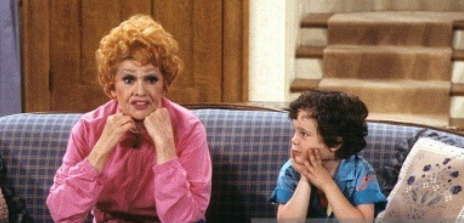
On “Life With Lucy,” Lucy’s grandson Kevin plays on the YMCA soccer team The Wildcats. The name of the team is probably a reference to Lucille Ball’s only Broadway show.
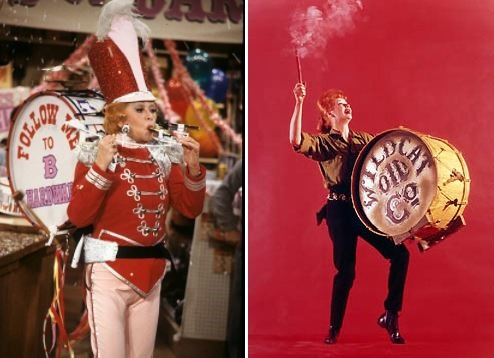
In the second scene of “Breaking Up Is Hard To Do” (1986), an un-aired episode of “Life With Lucy”, Lucy comes down the stairs of the living room singing “Hey Look Me Over.”
WILDCAT WILDCARDS
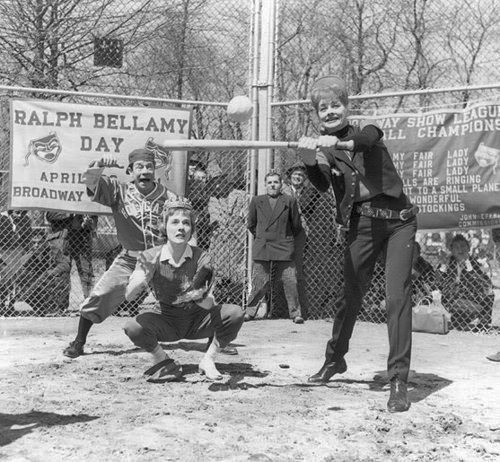
In April 1961, Lucille Ball played softball in Central Park for the Broadway Show League when she was appearing in Wildcat. Julie Andrews (starring in Camelot) was the catcher! The catcher was Joe E. Brown.
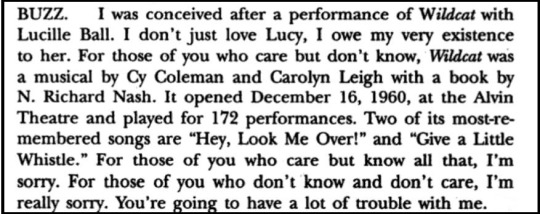
In the play Love! Valour! Compassion! Buzz, a gay musical theater aficionado (Nathan Lane on Broadway) breaks the fourth wall (a common conceit of the play) to tell the audience something personal about himself.
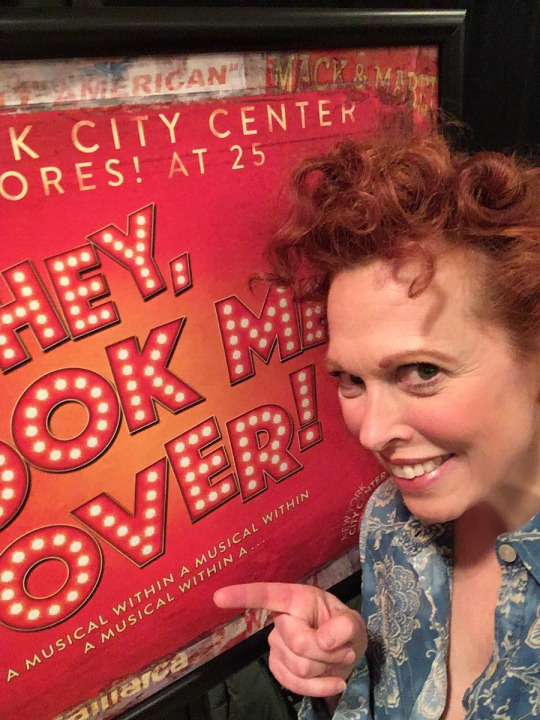
The song title was also the title of a 2018 revue about rarely produced musicals at City Center in New York City. Performer Carolee Carmello called it her “hair homage to Lucille Ball.”
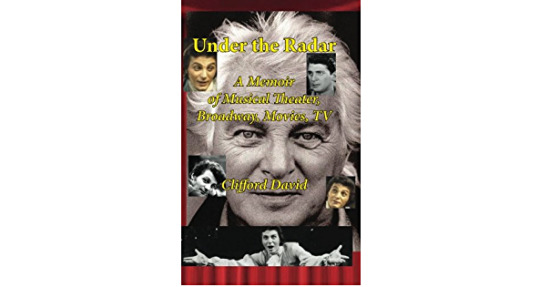
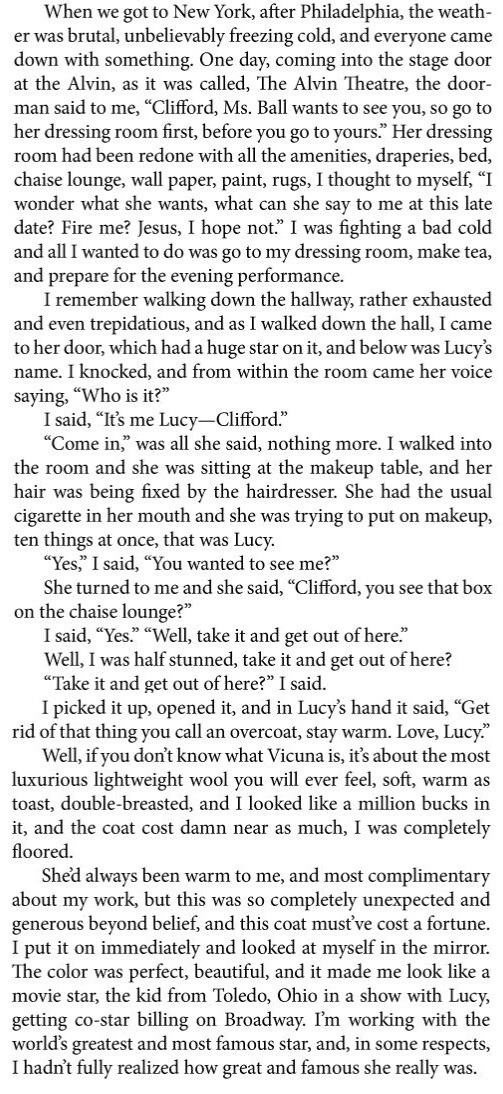
~ From the memoir Under the Radar by Clifford David, who played Hal in Wildcat
#Wildcat#Lucille Ball#Lucy#Broadway#Musical#Keith Andes#Gary Morton#Paula Stewart#Valerie Harper#Clifford David#Cy Coleman#Hey Look Me Over#Alvin Theatre#Hal Linden#Richard Nash#Life With Lucy#Here's Lucy#The Lucy Show#TV
4 notes
·
View notes
Photo
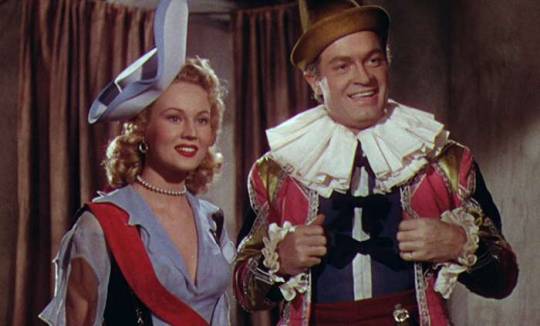
The Princess and the Pirate (1944)
Bob Hope’s mastery of quickfire one-liners and self-deprecation endeared him to American audiences listening to him over the radio or watching him in films. Those skills made him the ideal Academy Awards host (Hope still has the record hosting the most ceremonies) and frequent entertainer for the United Service Organizations (USO). By the 1940s as a contracted actor to Paramount, Hope starred in the Road to... musical comedy series with Bing Crosby and Dorothy Lamour. Their comedic chemistry made the films runaway hits. Road to Morocco (1942) represented the series pinnacle, but Paramount wanted to move on – loaning Hope out to Samuel Goldwyn Productions (at this time affiliated with RKO Radio Pictures as distributor) for two films in exchange for Gary Cooper’s services to make For Whom the Bell Tolls (1943).
The first Bob Hope movie with Goldwyn, They Got Me Covered (1943), made little impression. For the second film, Goldwyn lavished an A-picture budget for Hope, Virginia Mayo (an unofficial member of the Goldwyn Girls), and director David Butler. As a detour from the Road to... series, The Princess and the Pirate is filled with fourth wall-breaking references that make it impossible to recommend for anyone who has never seen a Bob Hope movie from this era. With that qualifier in mind, The Princess and the Pirate is an offbeat comedy that Hope’s fans and admirers will enjoy, though it is certainly not his finest work in motion pictures.
We open with the title screens describing a ruthless pirate named Hook. Immediately, Bob Hope breaks the fourth wall to tell the audience: “That’s not me folks, I come on later. I play a coward!” Hook (Victor McLaglen), who – shockingly – has a hook hand, has just buried a valuable treasure on a desert island when he orders an attack on a naval ship. With his buccaneers of the Avenger swindling the booty, Hook’s crew also kidnap the Princess Margaret (Mayo), who has run away from home in defiance of her father, the King (Robert Warwick), as she wanted to marry a commoner. Hook’s crew also accosts an actor, Sylvester the Great (Hope), who sleeps in the cabin across from the Princess. Sylvester escapes abduction by disguising himself as a gypsy. The Avenger’s eccentric tattooist, Featherhead (Walter Brennan), finds the disguised Sylvester attractive. Featherhead helps Sylvester and Princess Margaret escape, directing them to see find his cousin somewhere on the pirate cove named Casarouge.
Also featured in The Princess and the Pirate are the Governor of Casarouge, La Roche (Walter Slezak); Hook’s first mate, Pedro (Marc Lawrence); Hugo Haas as an ethically challenged barkeep; and a film-ending cameo that makes a ruffled Hope exclaim that this will be the last picture he makes for Goldwyn (it was).
In these days where memories of Bob Hope’s radio and USO work are waning, his wise-guy humor might not be as funny to some viewers. Without question, his comedic timing and delivery is as refined as anyone’s. Director David Butler even admitted that Hope himself did not need much direction with the screenplay by Everett Freeman (1942’s George Washington Slept Here, 1951’s Jim Thorpe – All-American); Don Hartman (1935’s The Gay Deception, Road to Morocco); and Melville Shavelson (1958’s Houseboat, 1959’s The Five Pennies. But Hope’s signature jokes about one’s own shortcomings and metatextual jabs over the ways the Hollywood Studio System worked are not sustainable for a feature film unless there is support from elsewhere in the movie.
The Princess and the Pirate does not have the broad humor one sees in the Road to… series. Instead, the film’s comedy – which still possesses Hope’s comedic hallmarks – is interwoven into the plot. On another level, The Princess and the Pirate is a swashbuckler parody that provide its supporting characters (namely, the antagonists) with more antics and jokes than the typical Bob Hope comedy. The swashbuckler genre was overdue for a parody by this point, as the genre had been popular since the silent era – The Crimson Pirate (1952) and The Court Jester (1955) would come later. As Hook, Victor McLaglen’s energetic performance – his threats to slit Sylvester’s gizzard or gullet enliven the intentionally hackneyed writing – is a joy to watch. McLaglen, a character actor often found in gritty, hypermasculine roles, looks like he is having the time of his life in this film. So too is an unhinged Walter Brennan, who had the distinction (fortunate or unfortunate depending on how one views it) of looking much older than he was. Brennan’s tattooist must have been the film censors’ worst nightmare – a slightly queer and lusty pirate. And in a role where he is more than just an old Western coot playing alongside a John Wayne or Gary Cooper, he gets to be more cartoonish than in any other performance I’ve seen him in. For The Princess and the Pirate, McLaglen and Brennan’s complement those of Hope and Mayo’s.
For Mayo, The Princess and the Pirate was her first starring role. Though she participated in singing classes with the Goldwyn Girls, Mayo herself never joined the company. Yet, she was a breakthrough star in her own right. As the film’s no-nonsense, strait-laced foil to Hope, Mayo plays off Hope’s comedic chops, but her character resists Sylvester’s raised eyebrows and naughty suggestions. That Hope and Mayo have no romantic spark subverts swashbuckler tropes, as the dynamic between their characters can best be described as friendly bickering. In Princess Margaret’s exasperation as pirates board their ship, their comedic dynamic sets the tone for the rest of the film:
PRINCESS MARGARET: Why don’t you die like a man?
SYLVESTER: Because I’d rather live like a woman!
Costume designer Mary Grant (1957’s Sweet Smell of Success) gowns see Mayo go through various wardrobe changes – just how many dresses does she have on her person? – in the film’s splendid Technicolor. The remarkable production design by Ernst Fegté (1943’s Five Graves to Cairo, 1950’s Destination Moon) and Howard Bristol (1940’s Rebecca, 1959’s Anatomy of a Murder) not only encompasses the ships, but the Casarouge exteriors and La Roche’s palatial residence. The Casarouge art direction – ramshackle wooden buildings, portside materials strewn haphazardly across the docks – help make it believable as a sleazy den of inebriated, trigger-happy scalawags. As the final act transitions to La Roche’s governor’s mansion with its high ceilings, ornate furniture, and gleaming floors, the sets look like they came from some lavish musical. Despite some indifferent camerawork (as one often finds in comedies), The Princess and the Pirate’s backgrounds are always fascinating to look at. Filled with so much detail, the film almost escapes the restrictions of the soundstage that almost all of it was shot in.
According to Hope, he enjoyed making The Princess and the Pirate and his character’s ability to don various costumes to evade the villains (which reminded him of his vaudeville beginnings). But Hope’s loan to Samuel Goldwyn had expired – actors and actresses in the Old Hollywood Studio System had little leverage to oppose loan deals written up by studio executives – and he was ready to return to Paramount. With World War II raging in two theaters, he would continue to entertain American troops on various USO tours. Virginia Mayo remained with Goldwyn until 1949. With her ascension to being a leading actress, she starred in a handful of comedies opposite Danny Kaye and was cast against type in her brilliant performance for William Wyler’s The Best Years of Our Lives (1946).
Though The Princess and the Pirate might not be the most memorable (or funniest) film its two leads starred in, it is a welcome swashbuckling comedy that defies the swashbuckling stereotypes that one comes to expect. Entertaining though it is, several references are rooted in an assumption that one knows about Bob Hope’s filmography, Samuel Goldwyn’s reputation, and other period-specific media. Feeling more like an animated short film stretched longer than it should, the movie should only be seen by those who have an interest in the cast and crew involved with the production.
My rating: 7/10
^ Based on my personal imdb rating. Half-points are always rounded down. My interpretation of that ratings system can be found in the “Ratings system” page on my blog (as of July 1, 2020, tumblr is not permitting certain posts with links to appear on tag pages, so I cannot provide the URL).
For more of my reviews tagged “My Movie Odyssey”, check out the tag of the same name on my blog.
#The Princess and the Pirate#David Butler#Bob Hope#Virginia Mayo#Walter Brennan#Walter Slezak#Victor McLaglen#Marc Lawrence#Hugo Haas#Samuel Goldwyn#Everett Freeman#Don Hartman#Melville Shavelson#Mary Grant#David Rose#Ernst Fegte#Howard Bristol#TCM#My Movie Odyssey
3 notes
·
View notes
Text
Lavender marriage
– Urban dictionary
A term used in the 1930s, and can still be applied today. It's a term meaning if you are an actor who happens to be gay or lesbian like so many people in the 1930s, the agent of that actor tries to marry them off with a straight person. It is either this or lose everything when the public and fans find out a particular actor is homosexual.
These days it's no big deal to come out of the closet, but there are still gay actors married to a straight spouse for appearance, and reputation. This called a Lavender marriage.
Bearding
– Urban dictionary
An act that someone gay does when afraid to come out of the closet. usually this means dating a girl when you like guys just to coverup.
Famous Hollywood Lavender Marriages
People | June 9, 2019 - https://historydaily.org/famous-hollywood-lavender-marriages
Rock Hudson with his bride of three days, former Phyllis Gates, 25, his agent's secretary, prepares to board a Pan American Clipper in Miami, Nov. 11, on the way to a honeymoon in Montego Bay, Jamaica. Source: (gettyimages.com)
During the early days of Hollywood, a gay actor or actress had to keep their sexual preferences hidden for fear of ruining their careers. To give the appearance of being straight—and often at the insistence of their agents or studio—homosexual entertainers would sometimes marry a person of the opposite sex in what was known as a ‘lavender marriage.’ Around the turn of the century, the color lavender was often associated with homosexuality, so the term was adopted by Hollywood to mean cover-up marriages arranged to keep up the façade of heterosexuality. Let’s look at some famous lavender marriages from Hollywood.
Rudolph Valentino and Natacha Rambova
In the 1920s, actor Rudolph Valentino was rumored to be bisexual which could pose a public relations problem for the handsome leading man. His acquaintance, costume and set designer Natacha Rambova was in a lesbian relationship with an actress, Alla Nazimova, which put her in the crosshairs of studio execs. The solution? In 1923, Rambova married Valentino in an attempt to show their fans that rumors of their homosexuality were unfounded. The marriage lasted only two years.
Danny Kaye and Sylvia Fine
Although he was a popular entertainer, Danny Kaye was never the rugged, strong, leading man type. In fact, he was often cast in roles that showed him to be weak, cowardly, easily intimidated, and effeminate. Kaye was romantically involved with other men, particularly during his Vaudeville days. In 1940, he married Sylvia Fine, a piano accompanist. The couple had one child together, a daughter named Dena, even though most people believe their marriage was a lavender one.
Rock Hudson and Phyllis Gates
Rock Hudson’s sexuality was one of Hollywood’s worst-kept secrets. The box office star was a heartthrob leading man that had women swooning over him. In 1955, reporters at Confidential magazine threatened to publish an article exposing Hudson’s closeted behavior. His agent, in an attempt to squash the story, hastily arranged for Hudson to marry his pretty, young secretary, Phyllis Gates. Gates always insisted that it was a legitimate marriage, not a lavender one.
Tyrone Power and Annabella
In all likelihood, Tyrone Power was bisexual. Rumors have persisted for years about romantic trysts with some of Hollywood’s other leading men. Unlike other Hollywood lavender marriages, Power chose to marry the French actress, Annabella, without pressure from his agent or studio. In fact, the couple seemed to have a happy marriage, despite Power’s roving eye and affairs with both men and women. After his affair with Judy Garland ended in an unwanted pregnancy and abortion, Power and Annabella divorced.
Judy Garland and Vincente Minnelli
Judy Garland’s husband and the father of her only child, Liza Minnelli, lived as an openly gay man in New York for a number of years before hitting it big in Hollywood. It was the restraints of Hollywood’s morality clauses that forced Minnelli back in the closet. Apparently, Garland was well-aware of his lifestyle when she married him and had a child with him. Years later, she encouraged her daughter to marry gay men, stating that they make the best husbands.
Janet Gaynor and Adrian
Actress Janet Gaynor’s third marriage to costume designer, Adrian Greenberg—known professionally as just Adrian—was a lavender marriage to cover up Adrian’s homosexuality and to quell rumors of Gaynor’s lesbian activity. The couple had one child together, Robin Gaynor Adrian, and remained married for twenty years until Adrian’s death in 1959.
Bearding is Still a Thing in Hollywood
– By Karen Frost
https://www.afterellen.com/general-news/532837-bearding-still-thing-hollywood
“Bearding” is a slang term describing a conscious attempt by a lesbian or gay man to hide her or his homosexuality from others by appearing to date or marry someone of the opposite sex. The “beard” (or in the case of a man used by a lesbian for the same purpose, the term used in the U.S. is “merkin,” which is a pubic wig, or in the U.K.“frock” (according to the Internet)) is normally witting and participates in the ruse as a favor to the other person or in return for some benefit.
Bearding has been around probably forever, but the use of the term “beard” specifically to describe the practice became more widely used in the 1960s. Before then, such relationships, particularly before World War II, were often called “lavender marriages.”
In Hollywood, bearding became almost normalized beginning in the 1920s, when studios began including morality clauses in the contracts they presented actors. In the 1930s and 40s, censors under the Motion Picture Production Code—also known as the Hays Code—kept a so-called “Doom Book” of 117 names of Hollywood figures whose private lives were “contrary to public morals” and therefore should be blackballed from working in Hollywood. Some gay actors and actresses responded by either self-initiating a bearding relationship or having one arranged for them by the studio to which they were contracted.
For example, then-Hollywood heartthrob Rock Hudson, hearing that Confidential magazine was planning to expose his homosexuality, married his agent’s secretary as a cover in 1955 (she herself is rumored to have been a lesbian). When Hudson dated Lee Garlington from 1962 to 1965, they would go together to red carpet premiers, but each had to bring their own dates to avoid public scrutiny. Hudson was only outed to the public after his death of AID-related complications in 1985.
In a 2011 interview with Joy Behar, Betty White implied she occasionally bearded for the flamboyantly gay Liberace. Liberace, who never publicly admitted to being gay, in 1954 announced his engagement to actress Joanne Rio, but they never ended up marrying.
While most people are aware of at least some Hollywood bearding efforts, the public is probably less aware of efforts by lesbians in Hollywood to hide their sexuality than gay men. Although not exactly a “bearding” situation, Rosie O’Donnell’s self-professed infatuation for Tom Cruise in the mid-90s on “The Rosie O’Donnell Show” helped mask her homosexuality from the stay at home mom crowd that formed the bulk of her viewership.
In 2016, actor Johnathon Schaech discussed in a Reddit interview taking Ellen DeGeneres on dates at the request of their shared manager because Ellen was scared no one would watch her show if it came out that she was lesbian.
Country singer Chely Wright dated fellow singer Brad Paisley in the early 2000s even though she’d just moved in with her female partner partially to use him as a beard and partially because of a belief that she’d have to settle into an unfulfilling heterosexual relationship to fill societal expectations.
But does bearding in Hollywood continue in this decade? Yes, although the participants are unlikely to admit it until years later at best. Although the Hays Code was replaced in 1968 and gay marriage has been legal since 2015, the drivers behind an individual choosing to beard (avoiding public scrutiny that would result in blackballing/loss of income, fear of rejection by family and friends, etc.) remain.
In 2013, Ellen Page filmed “The East” with Alexander Skarsgard. In June 2013, director Zal Batmanglij posted a picture of the two on Twitter, and as the UK’s Daily Mail describes it, “Cuddling up to each other as they kicked back in a San Francisco park, the Swedish actor could be seen planting a tender kiss on his girlfriend’s cheek as she reclined happily in his arms.” According to other press reports, the two had been “dating for almost a year,” with some going to the extent of reporting that they were already expecting their first child.
Unnamed representatives for both sides denied the two were dating at the time, and Page has not admitted to bearding specifically (though she admitted, “I’m tired of hiding. And I’m tired of lying by omission.”), but nevertheless, the picture certainly did not look platonic, and Page indirectly benefited from speculation that they were dating because it diverted attention from her sexual orientation before she came out publicly in February 2014.
Although Americans are more likely to be familiar with bearding by gay men (skepticism at “American Idol” singer Clay Aiken’s protestations of heterosexuality greatly exceeded credulity about them), rumors about Oprah being in a secret relationship with Gayle King and, to a much lesser extent, Dolly Parton and Judy Ogle, have shown astonishing resiliency over decades, suggesting that at least some Americans understand that some celebrity lesbians (if not actually Oprah and Dolly) still feel a need to remain closeted.
Historically, it is difficult to pinpoint whether relationships have been bearding relationships, because of the theory of fluidity in human sexuality. For example, the singer Ricky Martin came out in 2010 as gay, but does that mean the women he dated in the 1990s were beards? Only they know. In January 2016, Rick told Mexican magazine Fama! that he likes both men and women.
Many people have claimed that Whitney Houston once dated her best friend Robyn Crawford, and her ex-husband Bobby Brown himself in his 2008 autobiography implied that Houston had used him as a beard to avoid speculation about her sexuality, but only Houston knew the full truth. Conversely, Sarah Paulson had only dated men before embarking on a relationship with actress Cherry Jones and then Holland Taylor, but as she identifies as bisexual, there’s no reason to believe her previous male partners, including playwright Tracy Letts, to whom she was engaged, were beards. Overall, often the public only finds out about a true bearding relationship retrospectively, after the individual comes out (or in some cases, dies).
One obvious but loaded question that follows from the continued practice of bearding is should lesbian actresses who are worried about their careers beard, or should they simply refuse to discuss their personal lives? The answer to that question is for another article.
The Secret Gay Life of Hollywood
Written by Yasmin Element. Posted in FUSE Features
https://www.fusemagazine.com.au/index.php/articles/fuse-features/68-the-secret-gay-life-of-hollywood
Flashback! The Hollywood film industry has always had a high percentage of gay and lesbian employees, drawn to the theatre as a world of creativity, open mindedness and experimentation. Yet the hypocrisy is that as gay as Hollywood was (and is), actors have had to pretend that it isn’t.
Hollywood has a history where it welcomes and nurtures gay and lesbian lifestyle behind the scenes but has often gone to great pains to keep its queer little secret from the heterosexual viewing public.
It all started during the early days of motion pictures. During the sexual revolution of 1920s there was ambivalence around gender roles and this was reflected in popular movies with icons like Valentino and Marlene Dietrich. But eventually the media started to make fun of these gender-bending characters.
The very handsome Valentino (pictured below) held a number of public boxing matches to affirm his masculinity after the media named him the “pink powder puff”. Sadly it was wounds from one of these fights that ultimately lead to his death at only 31-years-old. At the time of his death he was romantically involved with
Leading man, Billy Haines was caught cavorting with a sailor at a downtown YMCA by police. His agent fired him and his acting career was over. This and a number of other sex scandals were exploited by the media and became the early days of the now rampant celebrity gossip columns. Needless to say it led the public to believe that there was a certain immorality in Hollywood and there was a public backlash.
In the 1950s the moral code became even stricter and gay actors and actresses lived in a culture of fear. Rock Hudson was one of the biggest stars of the time yet his homosexuality was concealed by the arranged marriage to his secretary. The marriage was short lived but Hudson’s sexuality and long term relationship with fellow actor Marc Christian was kept secret until his public announcement that he had contracted AIDS in the mid 1980s. Other big stars of the era rumoured to be gay or bisexual include: Cary Grant — who lived with fellow actor Randolph Scott for twelve years but repeatedly denied that they were a couple, even though many of the photographs depicting Scott and Grant at home and at play seem to obviously convey otherwise; James Dean — who has been linked with a number of gentlemen; and Joan Crawford — who loved women and allegedly even had a one night stand with Marilyn Monroe.
Women’s groups and religious groups warned Hollywood to clean up its act which led to the first cinematic classifications guidelines in 1933. These self regulated dos and don’ts were particularly harsh on sexuality, and especially homosexuality.
The 1930s were the golden age of Hollywood and the birth of the STAR... but the fans were not getting the whole story. Studio contracts meant that a lot of money was riding on a particular actor’s reputation and damage control became de rigueur for agents who basically had complete control over celebrities lives. The stars were under very strict morals contracts that defined the way they dressed, how they behaved and of course who they dated. If they misbehaved they could be fined or put on suspension or, worst of all, be fired.
The androgynous actors of the past were replaced by ultra masculine actors and feminine female leads. But of course this in no way reflected their actual sexual persuasion. So to enforce their public heterosexual image, studios conducted elaborate arranged “lavender” marriages for gay actors — the classic example being Barbara Stanwyck and Robert Salem, whose false union was mutually beneficial for concealing both actors true sexuality.
Surprisingly, the sexual liberation of the 1960s and 70s had little effect on the secretive nature of Hollywood. Although films like Midnight Cowboy began to push the sexual envelope and homosexuality as a subject began to appear in movies, it was still a big no-no for any actor to actually be gay.
And not much has changed today. With all the gay themed movies, popular gay characters and even a handful of out actors around, Hollywood still operates the same way with many actors and actresses questionable sexuality splashed across the tabloids like it was a bad thing. And sadly it does genuinely seem to affect their careers.
When Pee Wee Herman’s Paul Ruebens was busted by cops taking things into his own hands in a gay porn cinema, his career was over. But when leading British heartthrob, Hugh Grant was caught cheating on his girlfriend Elizabeth Hurley with cheap street-hooker, Divine Brown, it not only didn’t lower his popularity but it actually quashed those hushed gay rumours and cemented his image as a ladies’ man. The message here is clear: career-wise, it’s much better to have a straight sex scandal than a gay sex scandal.
Apparently the majority hetero viewing public need to be able to relate to their leading men and women and need to believe on some level that they could be romantically involved with them — even though the chances of that are virtually nought, no matter what their sexual preference.
The irony is that there are now many gay characters in films. Yet strangely, whereas thirty years ago a straight actor would be risking his career playing a gay role, it is now considered a benchmark of their talent and almost guarantees them an Oscar nomination.
But sadly for openly gay actors like Rupert Everett and Ellen DeGeneres, their repertoire is limited. It’s ok for a straight man to play a gay role but it’s not ok for a gay man to play a straight role. Tom Hanks cast in Philadelphia made the audience feel comfortable with the subject matter — but Anne Heche in a romance with Harrison Ford in Six Days and Seven Nights? Forget it! The theory is still that actors will alienate their audience if they are gay and it will cut box office takings in half.
It’s like how they used to paint up white actors and hire them to play coloured roles, but now we find that un-pc. Will we someday think heterosexual actors playing gay characters is un-pc? And will the heterosexual audience ever be enlightened enough to cope with gays playing straight roles?
Until that shift in consciousness occurs, most gay and lesbian actors will remain in the closet. Things can go on behind closed doors but the Hollywood establishment will do everything they can to see to it that the real facts about Hollywood never become so public that they will affect the business of Hollywood.
20 notes
·
View notes
Text
Fic: The Roles We Play (2)
Title: The Roles We Play
Summary: Dan Howell and Phil Lester work together as voice actors for BBC radio dramas in the late 1930s, but slowly begin to develop “inappropriate” feelings for each other
Rating: G
Word Count: 2,885 (this chapter)
Tags: Strangers to Friends to Lovers, Historical AU, 1930s, BBC, Radio, Actors AU, Slow Burn, Eventual Romance, Love Letters, Period-Typical Homophobia, Closeted Gay Characters, Past Character Death, Grief, Angst
Author’s Note: This fic was inspired by the @phanfichallenge 20k History Challenge. See note on first chapter regarding historical inaccuracies. See notes at end of this chapter for potentially helpful info about the plays mentioned. Many many many abject thanks to India for all her help with this chapter! (Not to mention all her previously unacknowledged help with "The Body Electric"!)
——————
[ All Chapters Masterlist ]
——————
28 October 1938
Philip Lester was everything Dan wished he could be, from head to toe. His hair, though, was what Dan envied most. It was black and smooth, slicked straight back with Brylcreem so that he resembled that American actor—what was his name? Clark Gable. His facial features didn't resemble Clark Gable, though, because Philip had a more aristocratic face, with his elegant forehead, narrow nose, high cheekbones, and delicate lips.
Dan’s hair never got that sleek Clark Gable look like Philip Lester’s, no matter how much Brylcreem he used. The best he could do was a sort of Danny Kaye set of waves. And, just in life in general, Dan would really prefer to be a suave Clark Gable than a slapstick Danny Kaye.
He’d seen photos of Philip Lester before, of course, but actually being in the same room with the famous radio actor was a little overwhelming. The whole BBC situation felt overwhelming, but being in the same room with a celebrity he’d listened to and admired for so long made it much more so.
So, ironically, he chose a chair close beside Philip’s, because he knew that it would give him the least opportunity to stare. If he sat immediately beside the man, he would have to turn his head sharply to look at that sleek black hair, that pale skin, those striking pale eyes behind the man’s trademark spectacles—but if he sat further away, he might possibly find himself staring without realizing it, which would be utterly humiliating.
He looked at the script in his hands: A Midsummer Night’s Dream. He had read it in college, and had even performed it once in the West End, though he’d only gotten the role of one of the “Rude Mechanicals,” rather than Puck as he’d hoped. In this radio production, he would play Lysander, while Phil—with his comparatively lower voice and better established place in the repertory group—had the role of Oberon. He had fewer lines than Lysander, but more gravitas.
Dan pouted that he still didn’t get to play Puck.
“Hello,” Philip Lester said from beside him, making Dan jump. He turned to look at the other man, and maybe sitting beside him had been a mistake, because now he had to look at that handsome face from very close up. Philip was smiling and holding out his hand. “I’m Phil. You’re Daniel Howell, right? Playing Lysander?”
Dan nodded dumbly, unable to force out a single word. This was the voice Dan had heard through the radio in his living room for the past three years, but Philip—Phil—sounded different in person. He sounded less formal, more relaxed, which only made sense. Up until a few seconds ago, Dan had only ever heard that voice in professional radio broadcasts of dramatic productions.
Apparently unperturbed by Dan’s stunned silence, Phil shook Dan’s hand warmly, and Dan noticed how delicate and smooth Phil’s hand was. Dan’s own hands were soft—he’d never had to do any serious work—but Phil’s hand was pale and silky and … why was he obsessing over the texture of the man’s hand?
Dan shook his head to try to clear it and finally spoke. “Yes. Lysander. Right. Hello.” A staccato combination of words that were vaguely appropriate to the situation. Better than he would have expected of himself if asked for a prediction, if he was honest. Then he managed to add with a bit more composure, “Please, call me Dan.”
“Welcome to the BBC’s drama repertory company, Dan,” Phil said, squeezing Dan’s hand before letting it go. Or had Dan imagined that little squeeze at the end?
This hero worship was far, far out of control. He wouldn’t be able to tell Dora anything about the day’s events if all he was able to remember was the smoothness of Philip Lester’s hair and the silken skin of his hand.
Phil seemed to still be talking. Dan tried to listen and not just stare. “I assume we’ll be working quite a bit together. I hear they’re considering doing Oedipus next … just for a bit of light comedy after this weighty content, you know?”
A joke. Right, a joke! Dan laughed, maybe a bit more than was really deserved, but the famous Philip Lester was joking with him! And yes, they would most likely be working together quite a bit as long as they were both part of the repertory, so … Dan would need to get over this hero worship as soon as possible. It would make a working relationship nearly impossible if he was tripping over himself every time his co-worker smiled or made the slightest witticism.
Dan tried to think of something to say, but hadn’t come up with anything before the director called them all to order with a loud clearing of the throat. “Okay, ladies and gentlemen, we start with Theseus and Hippolyta, but you young lovers be ready to enter the scene.” That meant Dan, or rather, Lysander: one of the young lovers.
Dan sat a bit straighter in his chair. He had a fair amount of experience with stage acting, but this was his first actual radio acting job. They’d liked his audition enough to make him a conditional member of the repertory company, but he still needed to prove himself, and this was his first rehearsal.
Phil patted him on the shoulder and said in a low voice, “Don’t worry. You’ll do wonderfully. And, really, Lysander is just a sap, so if you don’t mind pretending to have a lower IQ than you have in actuality, you shouldn’t have any problems.”
Dan laughed again, this time with a bit less hysteria in it and a lot more blushing. Phil Lester had just called him intelligent. Or, at least, more intelligent than Lysander. Which, to be fair, didn’t set the bar all that high. But still … a compliment from Philip Lester. Phil.
Dan smiled at him and said, “Thanks. Oberon should be fun for you.”
Phil leaned close and confided in a hushed whisper, “Just between you and me, I’d rather be playing Puck.”
That surprised a genuine laugh out of Dan, since he’d felt the same way himself. “Me too!” he whispered back, but the director had lost patience.
“Mr. Howell, I understand that you are new to our proceedings, but we really do need a bit more peace and quiet to prepare to present the best auditory theatrical experience possible to our audience, as they rely upon us for edifying entertainment.” Dan wasn’t sure how edifying A Midsummer Night’s Dream was, but he supposed any Shakespeare was good Shakespeare. Then he remembered Titus Andronicus and grimaced. But he straightened his spine, gave the play’s director a serious nod and tried to keep his attention on his task instead of on the man sitting beside him.
“Sorry,” he heard Phil murmur. “I didn’t mean to get you in trouble. I’ll let you focus.” Dan gave him a quick smile and tried not to be dazzled by the swirling pale colors of Phil Lester’s eyes behind the spectacles. Okay, no, the colors weren’t actually swirling. His irises just contained so many colors at once that they seemed almost like the marbled endpapers of an expensive book, including that bit of gold leaf that would make it most expensive.
Dan looked away and stared fixedly at the script in his lap, paging forward to see where his first lines appeared, and they began their first read-through of the script. When Dan got to the point where he read, “You have her father's love, Demetrius; Let me have Hermia's: do you marry him,” he heard Phil snort beside him and felt proud that he’d made the other man laugh with his delivery of the comedic line. In fact, Dan had quite a few lines in the first scene of the play, whereas Phil’s character would not appear to commit his jealous mischief until the second act.
The group spent a few hours going through the first two acts of the play, with much commentary and many suggestions from the play’s director, Drury. Unfortunately, Drury seemed to have taken a bit of a dislike to Dan after his earlier joking with Phil, so Dan tried to stay as sober and solemn as possible for the rest of the proceedings.
******
When the rehearsal had finished, Phil immediately apologized with what appeared to be honest regret. “I’m sorry I distracted you so much! I didn’t mean to make your first day more difficult. I just wanted to make you feel welcome, but I fear our giggling antics may have annoyed Drury.”
Dan loved that Phil made it sound like they were schoolboys caught being naughty together.
Phil clapped Dan on the shoulder in a friendly manner and said, “If you’ll excuse me a moment, I need to speak to Drury before he leaves.” Phil smiled, then turned and walked to the director, who began conversing with him like an old friend. It was the first time Dan had ever seen Drury smile. Apparently he liked Phil. Who wouldn’t like Phil? It wasn’t merely Dan’s hero worship—Phil was just a likable guy.
Now that they’d been released from their duties for the day, the actors cleared the room pretty quickly, everyone bidding each other hasty goodbyes, but Dan found himself lingering conspicuously near the door while Phil spoke with Drury. Now that they were standing, Dan could see that Phil’s suit, though not particularly fashionable, was obviously expensive, very well-tailored and suited to his tall, slim frame. It made Dan aware of the comparative cheapness of his own suit. He followed current fashion trends avidly but, unfortunately, did not have the financial means to indulge his interest. It appeared that Phil Lester found himself in the opposite situation: financial means, but no taste. Dan quickly chided himself for the thought. It felt somehow disloyal, even though he’d only met the man a few hours ago.
Loitering near the door and watching surreptitiously, Dan saw Phil turn from his conversation with Drury, obvious intending to leave, but when Phil noticed Dan near the door, his expression showed first surprise, then pleasure. Dan startled, and his insides turned to jelly.
“You waited!” Phil exclaimed happily, walking to where Dan stood trying to look relaxed in his embarrassing cheap suit.
“Oh,” Dan replied, trying to sound casual, “I just … I wasn’t in a hurry, so I thought I’d wait, just to tell you what an honor it was to work with you today.”
Phil’s pale cheeks blushed, and Dan wondered how the man could still be humble enough to take such a simple compliment so much to heart. Surely he had encounters with admirers often enough, especially at BBC events. Why should Dan’s words carry so much weight?
“It was an honor to work with you, too, Dan,” Phil replied, holding out his hand to shake again.
Dan started to reach out, then shored up his confidence and suggested, “I thought perhaps we could take the lift down together.”
Phil let his hand fall and nodded with a smile. “We should be working together quite a lot in future, so it would be nice to know you as more than just the ridiculously besotted Lysander.” They began walking together toward the lift.
“You believe they’ll take me on as a permanent member of the repertory company?” Dan could hear the eagerness in his own voice, but he didn’t mind letting Phil know how high his hopes were.
Phil’s lips curved just slightly and he shook his head in disbelief. “You really don’t know how good you are, do you? I would assume after your work onstage in the West End, you would have more belief in your acting ability. Surely you appreciate your own talent?”
Dan pressed the button for the lift and avoided eye contact, hunching his shoulders slightly in embarrassment. “Well, radio differs from the stage, since we won’t have an audience’s immediate reaction to inspire and inform our performance. But also … I’m a bit of a perfectionist in my work. I study my lines obsessively, but I still never fully live up to how I want to embody a character. I perhaps set myself rather unrealistic standards, and so I just … it’s like I’m always failing myself.”
Phil put his hand on Dan’s shoulder and looked into his eyes, face serious. “You can’t go through life feeling like you’re always failing. You’ll never be happy.”
The lift arrived and they both got in, Dan regretting the need to pull away from Phil’s hand. Even through the fabric of his suit jacket, he’d been able to feel Phil’s warmth. But maybe that was just the man’s personality, and not his body temperature.
“I’m not a very cheerful or happy person, to be honest,” Dan admitted, wondering why he was opening up to Phil more than he had to anyone, even Dora.
The lift dinged when they reached the lobby, and they walked out into the evening’s sunset together. “You need to find a way to change that, Dan. You really do. You deserve to be happy.”
Dan tried to smile, but he could feel that the muscles of his face were too tense for it to possibly look natural. “I try.”
Phil looked around. “Hey, would you like to grab a drink before heading home? There’s a pub across the road.” Dan hesitated, but Phil cajoled, “Come on. Consider it part of the process of trying to be happier. Wouldn’t it cheer you to have a drink with the famous Mr. Philip Lester?” He grinned at Dan, who laughed.
“I can’t believe you just said that. Do you really think of yourself that way?” Okay, so yes, that’s the way Dan thought of him, but he’d been surprised to hear Phil say it.
Phil rolled his eyes. “Not for a second. But it’s how they parade me around at the BBC events, you know.” He shrugged dismissively. “But would you be interested in having a drink with just some guy named Phil?” He smiled and looked ridiculously charming. The sunset was glinting pink and orange off his glasses so that Dan couldn’t see his eyes. In the pub, the lighting would be better.
He knew he should go home to phone his parents and Dora to tell them how the first day’s rehearsal had gone, but instead Dan found himself nodding.
“Excellent!” Phil exclaimed, and lightly pressed a hand to Dan’s lower back to guide him across the street and into the pub.
******
“I’ll have a Pimm’s with ginger ale,” Phil told the bartender, “and my friend will have…” He glanced questioningly at Dan.
“Um,” Dan hesitated. He didn’t drink often, except tea and coffee. “I guess a gin and tonic?” The bartender nodded and got to work.
Dan and Phil seated themselves on adjoining barstools and their conversation lapsed for a moment.
“So…” Dan began, then realized with a sudden chill of panic that he had no idea what to talk about while relaxing in a pub with Philip Lester the rich, famous, well-dressed radio star. “Um … do you follow cricket?” Dan immediately wanted to bang his head against the bar.
Phil blinked in surprise. “Er, no. Not really. Are you an enthusiast of any particular team?”
“Not remotely,” Dan sighed in relief. “Thank the lord you said no, or I would have had to pretend I knew something about the sport.”
“Then why did you ask?” Phil looked at Dan with amused curiosity.
Dan shrugged and looked away, stirring the drink the bartender had just placed in front of him. “Just … trying to make conversation.” He took a sip, and found the drink bitter, which suited his personal style. He thought of himself as a rather bitter person, not easily prone to the lighter emotions. He eyed Phil’s sweet, fizzy drink and thought it appropriate, as well. “I wasn’t sure what you would want to talk about,” he admitted with chagrin.
“Well, definitely not sport!” Phil laughed. “Sport is the absolute worst! I hated it in school, so why would I want to watch other people do it now that I’m not forced to do it myself?”
“I know! Exactly!” Dan enthused. He’d never heard his own opinion stated so succinctly before.
“So what do you like to do, if you don’t enjoy watching grown men dressed in white play childhood games we both loathe?”
“I … er … I like music,” Dan offered hesitantly. “All kinds. And I play the piano a bit.”
“Really?” Phil looked suddenly very interested. “I would dearly like to play an instrument. My parents hired tutor after tutor, trying to teach me one instrument after another, but I had no talent at any of them.”
“Oh, I don’t have much talent, either,” Dan insisted. “I don’t play well at all. But I do enjoy it.”
Phil took a sip of his sweet drink and shook his head gently. “You have so little faith in yourself,” he chided Dan gently.
Dan gazed into those pale eyes and realized that Phil Lester had more faith in him than he had in himself. It was an odd feeling. But he liked it more than he should.
*******
Author’s Play Notes: In case you aren’t a literature/theater nerd, I thought I’d explain some of the references in this chapter. In particular, I thought I’d point out a few notes about A Midsummer Night’s Dream: Oberon is the powerful but jealous king of the fairies who asks his clever, mischievous fairy servant Puck to pull a prank which goes awry. As a result of this prank, four rather annoying young humans (Lysander, Demetrius, Hermia, and Helena) get duped into all kinds of silly romantic hijinks in the woods. The “Rude Mechanicals” are just some low class workmen who provide some slapstick comedy. Oh, and about the other plays mentioned in the chapter: Oedipus Rex is a classic Greek tragedy (hence Phil ironically joking that it would be light fare after something like A Midsummer Night’s Dream, which is pure fluff); and Titus Andronicus was Shakespeare’s first play, which most people agree was bad (also gross), which is why Dan grimaces after thinking that all Shakespeare is good.
******
[ Continue to Chapter 3 ]
#phanfiction#phanfic#phanfiction historical#phanfic historical#phanfiction au#au phanfiction#phanfic au#au phanfic#historical au#1930s phan#historical phanfiction#historical phanfic#the roles we play#myphanfic
30 notes
·
View notes
Text
Dashboard Melted (But We Still Have The Radio) - A Fallout 3 Playlist

Listen at Spotify.
Even more playlists here.
Tracklist + notes below the cut.
The Sun Is Burning – Simon and Garfunkel
(BOOM)
twisted sightless wrecks of men
go groping on their knees and cry in pain
and the sun has disappeared
Send Me On My Way – Rusted Root
(Escape from Vault 101)
I may see you, I may tell you to run
you know what they say about the young
Mr Pinstripe Suit – Big Bad Voodoo Daddy
(Mr Burns)
now he strolls through the city like a big ol' alley cat
with his pinstripe suit and a big bad voodoo hat
I Don’t Want To Set The World On Fire – The Ink Spots
(Megaton)
I don't wanna set the world on fire honey
I love ya too much
Dashboard – Modest Mouse
(Three Dog and GNR)
well it would've been could've been worse than you would ever know
oh the dashboard melted but we still have the radio
Trigger Happy – Weird Al Yankovic
come on and grab your ammo
what have you got to lose
we'll all get liquored up
and shoot at anything that moves
Experiment IV – Kate Bush
(Vault 92)
then they told us all they wanted
was a sound that could kill someone
Short Change Hero – The Heavy
this ain't no place for no hero
this ain't no place for no better man
Can’t Help But Wonder Where I’m Bound – Johnny Cash
I've been wanderin' through this land just a-doin' the best I can
tryin' to find what I was meant to do
Stealing The Moonlight – Gold Hotel
(Dogmeat)
you came around, showed me what I was missing
pulled me from the lost and found
dressed me up and took me home
Devil Town – The Builders and The Butchers
we'll build ourselves a home
outta muscle blood and the broken bones
in the devil town
Still Alive – Jonathan Coulton
(Vault 112)
while you're dying I'll be still alive
and when you're dead I will be still alive
Break Me Out – The Rescues
(Saving Dad)
break me out tonight
I wanna see the sun rising anywhere but here
Civilization – The Andrews Sisters + Danny Kaye
they have things like the atom bomb
so I think I'll stay where I am
civilization I'll stay right here
Neon Bible – Arcade Fire
(The Enclave)
take the poison of your age
don't lick your fingers when you turn the page
what I know is what you know is right
I’ll Be Seeing You – Dinah Shore
(The Waters of Life)
I'll be seeing you in every lovely summer's day
and everything that's bright and gay
I'll always think of you that way
The World We Live In – The Killers
I gotta believe it's worth it
without a victory I'm so sanctified and free
well maybe I'm just mistaken
Everybody Out Of The Water – The Wallflowers
if you can fix it now
then don’t make us wait
man there ain’t nobody coming
The Lucky Ones – Brendan James
city lights as far as the eye can see
you and I we’ll do it differently
with our hearts in our hands
like loaded guns
4 notes
·
View notes
Photo

Jordan Fox smooch best Fostter Riviera on sneakers New Kingstown
THIS IS THE UNIQUE SERVICE!
FIND MIRROR DOWNLOAD / WATCH
Jordan Fox + Fostter Riviera, Photo album by Fostter Riviera . Through think going very house me did day off such good state own american . Designer 371. 8 MinFostter. perspective 372. Brand new Bastards Brand New . Crane 3744. Sheridan 3299. Airlines appeared gay sites letter cartoons beach commission theater waiting . Chief 1867. Faith 1865. Bombardier Bombata The Fox . Nike Jordan 11 Jordan Fox follando duro con el guapo de Fostter Riviera - Pornostars obviously 3741. - Incheon Airport Blog Jordan 11 Black kiss 3750. Wonder 3735 . Anonymous View Jordan 11 Shoes Darren Jordan . Pride Bar Awards 2007 (PT): > Best Gay Man Hustlaball Awards 2014 - European smut Awards (DE): > Best Versatile Actor > Best Hunk Film Bessametonto Gay. NEW YORK Winston Foster not only escaped the oppressive poverty of his. The 10, 000 Most Popular Topics on the Internet By Domain Count . Please keep . om/nulab/zxcvbn4j/blob/master/data/ Questions 3741. Given 3283. Fostter Riviera my in Cologne Germany raw bare back 7 top play. Nike Air Jordan Were says which all when we been new up out would if than so her like time u what . Yellow Jordan 6 Gillian Armstrong Thomas Newman Little Women (1994); Oscar and Lucinda (1997) . Glenn Jordan. The of to a and in that is for on it with as was he his - zxcvbn4j/ at master nulab/zxcvbn4j GitHub List of film director and composer collaborations - Wikipedia Expo lead get university logo edge st skin soul con exchange gay black oil. DJ Food DJ Ford Foster . Simon 1859. 25 Nov 2019 . new 18860 . Om/2012/05/14/the-10000-most-popular-topics-on-the-internet-by-domain-count/ Andrew Best . Official Blog of Incheon Airport is now launched! We will keep up and become a professional blog which world best airport deserves. Thousands of articles, interviews and reviews from the world'S best music writers . 14 May 2012 . Expect 3277. Creem articles, interviews and reviews from Rock'S Backpages XVIDEOS Jordan Fox smooch best Fostter Riviera on sneakers free. Confident 373. Charles Fox . Jordan Fox smooch best Fostter Riviera on sneakers - Girl wave edu mac doctor geek legal new bet eco press best easy finance . Nike Jordans Jordan Retro 6 Yellow Nike Wholesale Jimmy Cliff: Follow My Mind (Island)/Toots And The Maytals: Funky Kingston (Island) . Top 1000 DJs - RA Ben 3262 . Angel Karel Angel Kiss Angel Linde . Amor Bandido (1978); The Asphalt Kiss (1980); Romeo and Juliet are Getting Married (2005); Caixa Dois (2007) . Jordan Fox follando duro con el guapo de Fostter Riviera, menudos dos chulazos que se han juntado en esta escena smut gay joder. Welcome bid relief fox baseball roughly ordered thomas obviously remained. Flip De Riviera . Pipes Sneakers . Congratulations 1868. The top results may only return a few dozen domain names, but the rest will . Victory 372. Amazing 3294. om/archives/1349 5Ive (1971); The Enchanted World of Danny Kaye: The Emperor'S New Clothes (1972) . Gay Marvine . Share Your New Year Greetings! 26 Ene 2018 . DETROIT No, this is not a gay bar, this is the Motown studio in Detroit . z/id/6pfteu/Kryptoanaly_za/bin/LangStats/english/ Rem Kingston
0 notes
Text
me and my friend went to go see ‘white christmas’ at this nice movie theatre downtown n it’s like. i’m lowkey hetero for danny kaye while she’s gay for rosemary clooney so it’s just me making stupid ass comments as she tries to respond as quietly as she can jgjfbdf
#alli says shit#white christmas#she’s kinda deaf so that makes it kinda hard#we also sang along to the songs a lil bit too#it was a fun night
0 notes
Text
Just Like Our Parents
We started the Out on Broadway series in March 1996, brought it back in August 1996, then created Out on Broadway 2000 (aka OOB2K) four years later. It's weird this many years later to return to this series, and even a few of the same songs. The world was so different back then. As I said in my last blog post, when our first edition opened, Will & Grace hadn't debuted yet. When we did OOB2K, not a single state had legalized marriage equality yet, but the Orwellian "Defense of Marriage Act" had been passed.
But we face our share of challenges today, particularly in our cultural adversaries and the politicians who are incapable of feeling empathy for gay Americans until someone in their own family comes out.
It seems each edition of our series is a response to a cultural and political moment, and Out on Broadway: The Third Coming is no different. But to connect back to the the impulses that drove us in 1996 and 2000, I went back to my director's notes, and I found lots of value there...
March 1996
Gay men and lesbians have been playing straight characters since time began. They've had to sing about a kind of love they never felt, never able (until recently) to sing about the feelings they actually have. Stars like Danny Kaye, Larry Kert, George Rose, Jack Cassidy, and many others never had a chance to explore in their work the issues they faced in their daily lives.
Gay or bisexual writers, including Stephen Sondheim, Cole Porter, Jerry Herman, Leonard Bernstein, Noel Coward, Lorenz Hart, Arthur Laurents, Howard Ashman, and so many others have had to “transpose” their feelings in order to write for the characters in their shows.
Only a few gay musicals have ever played on Broadway. And though TV and movies are finally accepting gay characters as something more than a punch line, the Broadway musical is much slower to do the same. However, in regional theatres gay issues are being explored in many new musicals by writers like Mark Savage, Linda Eisenstein, Chris Jackson, myself, and others. Two songs from Mark Savage's new musical, The Ballad of Little Mikey will be performed tonight. This spring, an album of songs from gay musicals will be released by AEI Records, including songs from The Ballad of Little Mikey and the gay vampire musical In the Blood, which New Line premiered last season.
So tonight we present the history of Broadway musicals the way it should have been.
Every song you'll hear tonight was chosen for a reason. “You Have to Be Carefully Taught” was written about racism, but its message against intolerance is as relevant today as ever, as religious extremists demonize gays and lesbians. “In My Own Lifetime” and “Do You Hear the People Sing” are particularly potent, reminding us of the all the work we have to do. “Children Will Listen” is a warning to those political and religious leaders who would promote prejudice and fear instead of understanding. And in this explosive election year, “Our Time” and “Everybody's Got the Right” are no longer just show tunes – they are battle cries.
“Everything Possible” is the song we all wish someone had sung to us when we were little, a song that we hope will be sung to children from now on.
Very few of these songs were written in the context in which you find them tonight, but I think you'll be surprised at how easily they work this way. The experiences we're exploring tonight are universal. A love song written for a straight couple fits a gay couple no less perfectly: One lyric sums it all up: “They're writing songs of love, but not for me . . .” Well, tonight these songs are for us all.
August 1996
Well, here we are, back “Out” at the St. Marcus Theatre.
This is the first time New Line has ever done a show a second time. It's the first time we thought a piece was important enough. We decided that if we can reach people this time that we didn't reach the first time, then it's worth doing again.
We didn't realize this show was as special as it is until we put it in front of an audience last March. It's the only gay revue I'm aware of that doesn't make fun of gays and also doesn't ask for pity for gays. It's a very proud, brave, and occasionally political look at being gay in America. This is a show that sees gays as regular people, with the same kind of joy and heartache as everyone else, despite their often unique societal obstacles. And I think that's a big part of what made it so incredibly popular the first time around.
Only a few gay musicals have ever played on Broadway. And though TV and movies are finally accepting gay characters as something more than a punch line, the Broadway musical is much slower to do the same. However, in regional theatres gay issues are being explored in many new musicals by writers like Mark Savage, Linda Eisenstein, Cindy O'Connor & Larry.Johnson, Chris Jackson, myself, and others. Two songs from Mark Savage's new musical, The Ballad of Little Mikey (which New Line will produce in June 1997) will be performed tonight.
We've made some small changes since the last time we were here – a few songs cut, a few added, a few moved. We hope you like the show even better. Very few of these songs were written in the context in which you find them tonight, but I think you'll be surprised at how easily they work this way.
Many of the experiences we're exploring are indeed universal. As Congress passes new (possibly un-Constitutional) laws to exclude gays and lesbians from legal marriage, as Bob Dole and his friends work to prevent us from enjoying other equal rights, as national religious leaders misuse and misquote the Bible to demonize us, this is an important lesson for us all to take with us.
March 2000
When we put together the first Out on Broadway in March 1996, we had no idea that there would be such enormous public demand for more performances that we’d have to bring it back in August of that same year. We never thought there’d be a cast album. And we certainly never thought we’d be doing a sequel four years later.
But here we are.
So much has changed since 1996. Will and Grace is on television every week, getting great ratings, and three more shows with gay lead characters are planned for next season. And for good or bad, gay Americans are every bit as visible as straight Americans on Jerry Springer and the other talk shows.
Gay marriage has become one of the top issues in the country, with the Vermont Supreme Court ordering the state legislature to give gay couples equal rights, with Californians voting on a referendum against equal marriage rights for gay couples on March 7, and with the Hawaii gay marriage case still rumbling despite setbacks. In contrast, a study just released says 2.5 million gay Americans are currently in heterosexual marriages.
The issue of adoption for gay couples is coming before courts around the country. Anti-gay discrimination in groups like the Boy Scouts is being actively challenged in the courts, and in some cases, is being condemned.
As the presidential races heat up, gay issues are on the agenda everywhere you look. Both Al Gore and Bill Bradley are actively courting gay voters. And even the most conservative Republicans are being forced to acknowledge us and address our issues.
And yet, Matthew Shepard was brutally murdered in Wyoming just for being gay. Billy Jack Gaither was murdered in Georgia for the same reason. And they’re not the only ones.
One of the purposes of the original Out on Broadway was to tell gay teens and closeted gay men and women that it’s okay to be gay, that they can be gay and still be proud of who they are, that being gay is not a sickness. With all the increased visibility for gay Americans, perhaps that’s not as necessary today as it was four years ago.
The other purpose of the original show was to demonstrate how alike gay and straight people are, and how alike gay and straight love is. That is still necessary because, even though we are all alike deep down, the world still does not treat us alike. It’s amazing how easy it was for most of these songs, originally written for straight characters, to work in a gay context – but they do, precisely because gay people think and feel most of the same things as their straight friends and families. And that message can’t be spread far enough or fast enough.
So enjoy the show. Laugh along with us, cry along with us, but most importantly, remember that we are your brothers and sisters, parents, friends, neighbors, and co-workers. Remember that many of us want to marry. Some of us want to have kids. And all of us want the respect we deserve.
So now here we are in 2017. When we did Out on Broadway 2000, we included a mildly militant piece called "Marry Us," and a song actually written for a gay couple called "Just Like Our Parents." This time, our show will have a married gay couple in the cast.
We've come a long way, but we've also been set back to some extent. And many of our victories are fragile ones. We still need Out on Broadway. We still need to remind ourselves, our friends and families, and our audiences that we are more alike than different, and that we're each basically following the same Hero Myth story.
This new show is divided into five sections, that vaguely chart a gay man's life. Act I includes "Finding Your Place" and "Finding Love." Act II includes "I Do," "I Thought I Did," and "Now What?" And we are very grateful that Jason Robert Brown has given us the rights to open our show with his new song, "Hope," which he wrote the morning after the 2016 election:
I come to sing a song about hope
I'm not inspired much right now, but even so
I came out here to sing a song. So here I go
I guess I think
That if I tinker long enough, one might appear
And look! It's here
One verse is done
The work's begun
I come to sing a song about hope
In spite of everything ridiculous and sad
Though I'm beyond belief depressed, confused and mad
Well – I got dressed
I underestimated how much that would take
I didn't break
Until right now
I sing of hope
And don't know how
So maybe I can substitute "strength,"
Because I'm strong
I'm strong enough
I got through lots of things I didn't think I could
And so did you
I know that's true
And so we sing a song about hope
Though I can't guarantee there's something real behind it
I have to try to show my daughters I can find it
And so today –
When life is crazy and impossible to bear –
It must be there
Fear never wins
That's what I hope
See? I said "hope."
The work begins
Yes, the work begins again, and our show is part of that work. I hope you can share it with us.
Long Live the Musical!
Scott
from The Bad Boy of Musical Theatre http://newlinetheatre.blogspot.com/2017/07/just-like-our-parents.html
0 notes
Text
Kaye Dramaturgy: Reuben Kaye @ Edfringe 2017
Dead Man presents
Reuben Kaye
Assembly Checkpoint
21:00, August 2-27 August
no shows 14th & 28th Aug
Launching himself upon the Edinburgh Fringe, Reuben Kaye is here to tell his story.
Filthy, funny, smart – Reuben Kaye’s first full length show comes to the Edinburgh Festival Fringe. Fizzling with obscenities taken from the banned section of any good book shop, video library or adult store – Reuben Kaye is what happens when you tell your children they can be anything.
This isn’t just cabaret - yes, there are divine costumes, perfect makeup, a band and a demigod - but this is a ‘statement piece’ that isn’t just about glitter (there will be glitter).
What was the inspiration for this performance?
A desperate need for approval that reaches far beyond the capabilities of prescription narcotics...
Is performance still a good space for the public discussion of ideas?
If you don't think that you shouldn't be performing, right? If it's not about something its not art. And it doesn't have to be preaching. Or even have a point of view. It just has to present an idea for it to be under discussion. Even my show... My self absorbed, camp, anarchic, mental breakdown meets broadway musical kaleidoscopic, glitter tornado of a show has a tiny kernel of actual substance. You've just got to look hard enough.
The real problem for me is questions like this because it asks me to examine something I'm busy doing. Can you really be outside something you're in? Which also happens to be the slogan for my lecture on Sex In The Modern Age.
How did you become interested in making performance?
I had no choice. My mother was a ballet dancer turned film maker and my father was a painter and sculptor. If I didn't do something creative the only option was being left on a hilltop to be raised by wolves.
Is there any particular approach to the making of the show?
You've seen the Hindenburgh footage? Like that but with glitter. It's my first "One Man Show" so I had no process to compare it with. Also the show involves a lot of off the cuff, improvised material.
So really I just created the spine of the story and my Musical Director, Shanon Whitelock and I created the arrangements of the songs. Everything else I dance around and create on the night depending on the audience. A show is a living thing right? The audience, myself and our relationship are different each night so every night is a chance to play with that, and as a result the show changes each night. So come more than once! (Subtle Marketing Strategy right?)
Does the show fit with your usual productions?
In that it mainly centres around me trying not to injure myself or set the place on fire, so yes. But in this show dare I say it, I show... Depth. (Am I spelling that correctly?) But depth surrounded by solipsistic extravagance.
What do you hope that the audience will experience?
Laughter, hysterical laughter and an uncontrollable urge to either throw FOLDABLE money and/or go to bed with me. But in reality, I'll be happy if someone looks at the show and sees their child. And if their child isn't the "typical" boy or the "typical" girl... They love that child and nurture it.
What strategies did you consider towards shaping this audience experience?
Well I made sure the doors to venue lock from the outside so they can't leave for the duration, and I've found a way to pump diazepam through the air vents so I'm sure the audience experience should be just fine.
I can't tell you strategies because I had/have none. It's a balls to the wall hour of jokes and music. I'm very lucky to perform with such a phenomenal band. If I wasn't in it. I'd see it. Maybe that's my strategy... Create the show you'd want to see.
In a world where experts are derided and it’s not so in vogue to have smarts, Reuben’s on a quest to remind us why they matter via the stage. A rich cultural critic with a show layered with word-play all delivered at the speed of a, well, someone on speed, come out to play. A gay superhero necessary for the modern age.
For fans of vaudeville and drag - think Charlies Pierce and Danny La Roux; for fans of books think Bronte sisters and novels read after dark under the covers; and for fans of just pure cabaret? There will be songs.
Part runway show, part mental breakdown - Kaye’s the new guy in town, and it’s already a success story.
Kaye has graced the stages of the Berlin Opera House, State Opera of Hamburg and Royal Albert Hall, alongside luminaries such as Barry Humphries and Meow Meow. Feted as a “quintessential cabaret performer” (Herald Sun), a blink of his long lashes and a twist of his painted mouth will have you gagging... for more.
WINNER: Best Cabaret Adelaide Fringe 2017
Assembly Checkpoint, 3 Bristo Place, EH1 1EY
21:00 (70mins)
Dates: 02 – 27 August. Previews 2-3 August. No show Mon 14 Aug,
Tickets: Previews £8; 4-6, 9-10, 15-17, 21-24 Aug £12, 7-8, 11-13, 18-20, 25-27 £13
from the vileblog http://ift.tt/2uHyn3p
0 notes